Humanities & Social Sciences
Makerere Marks World Press Freedom Day with Call for Media Protection and Journalist Safety Ahead of 2026 Polls
Published
10 months agoon
By
Jane Anyango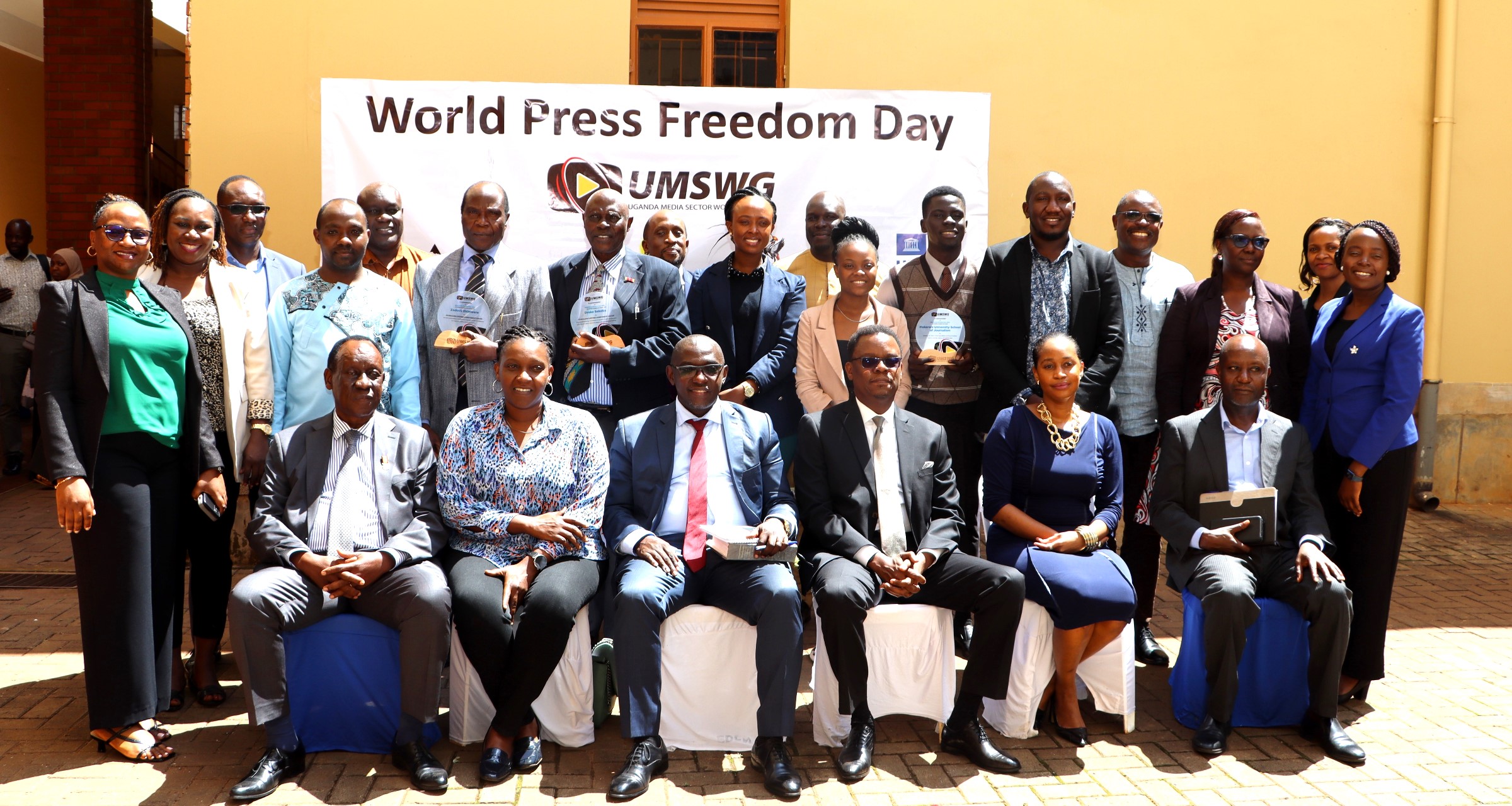
Makerere University, Kampala – May 6, 2025
Makerere University joined the rest of the world in commemorating World Press Freedom Day with a strong call for greater respect and protection of journalists, particularly as Uganda approaches the 2026 general elections. World Press Freedom Day is observed annually on May 3 to raise awareness about the importance of press freedom and to remind governments of their duty to respect and uphold the right to freedom of expression
This year’s celebration was held under the global theme “Defending the Truth in an Age of Polarization and Distrust”, .It was organised under the Uganda Media Sector Working Group in collaboration with the Department of Journalism and Communication and media stakeholders including, CIPESA, Oslo Metropolitan University, the Uganda Human Rights Commission, the African Centre for Media Excellence, UNESCO, the Uganda Media Council, and Media Focus on Africa.
The celebration brought together members from academia, media organizations, civil society, government ministries and agencies at the university’s Conference Hall at the College of Engineering, Design, Art and Technology.
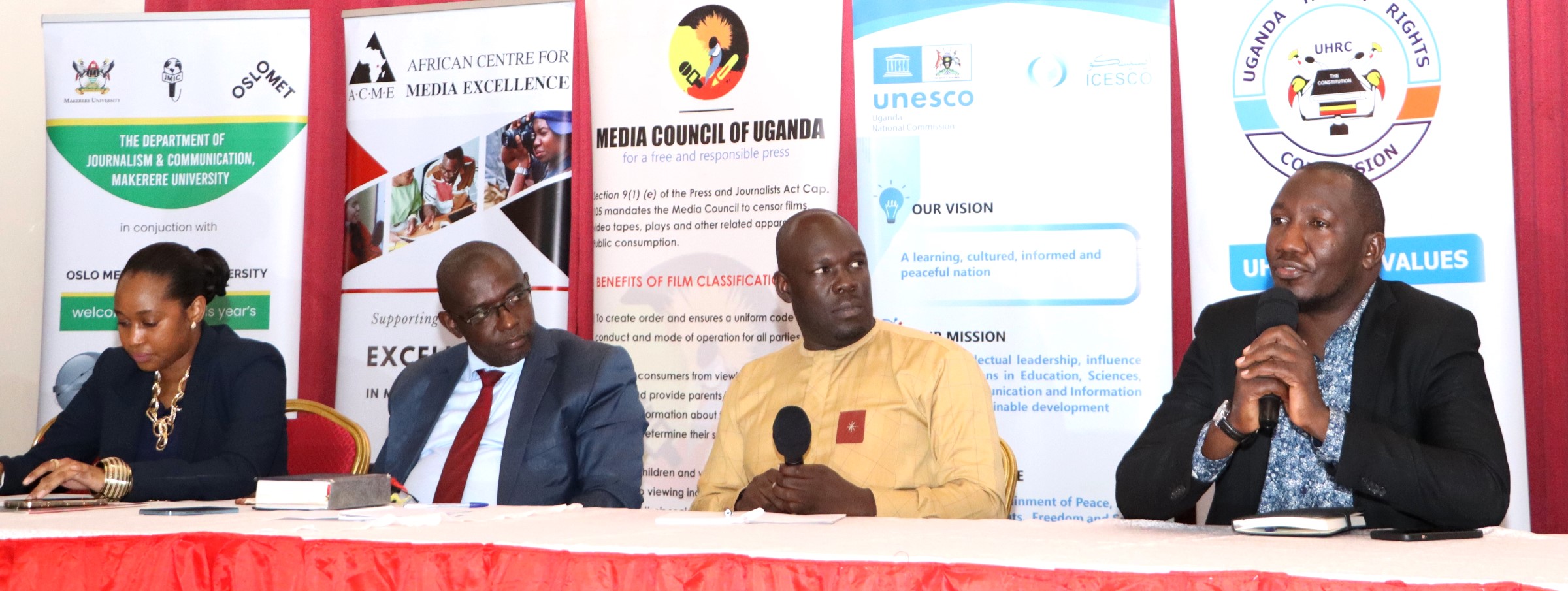
The event featured speeches and a key note address, panel discussions, media awards and trainings on different media aspects including Online security, Misinformation and Fact Checking and, Physical security.
Speakers from various sectors denounced attacks on journalists and urged government agencies to uphold constitutional freedoms, especially during politically sensitive periods. The gathering heard passionate appeals for reforms, including better legal protections for media practitioners and stronger enforcement against those who attack the press.
The celebrations were presided over by Paul Ekoju, Chairperson of the Uganda Media Council, who represented the Minister of ICT and National Guidance. Ekoju emphasized the critical role of journalists in safeguarding democracy, while cautioning against the growing threats to press freedom including physical violence, intellectual compromise, and political interference.
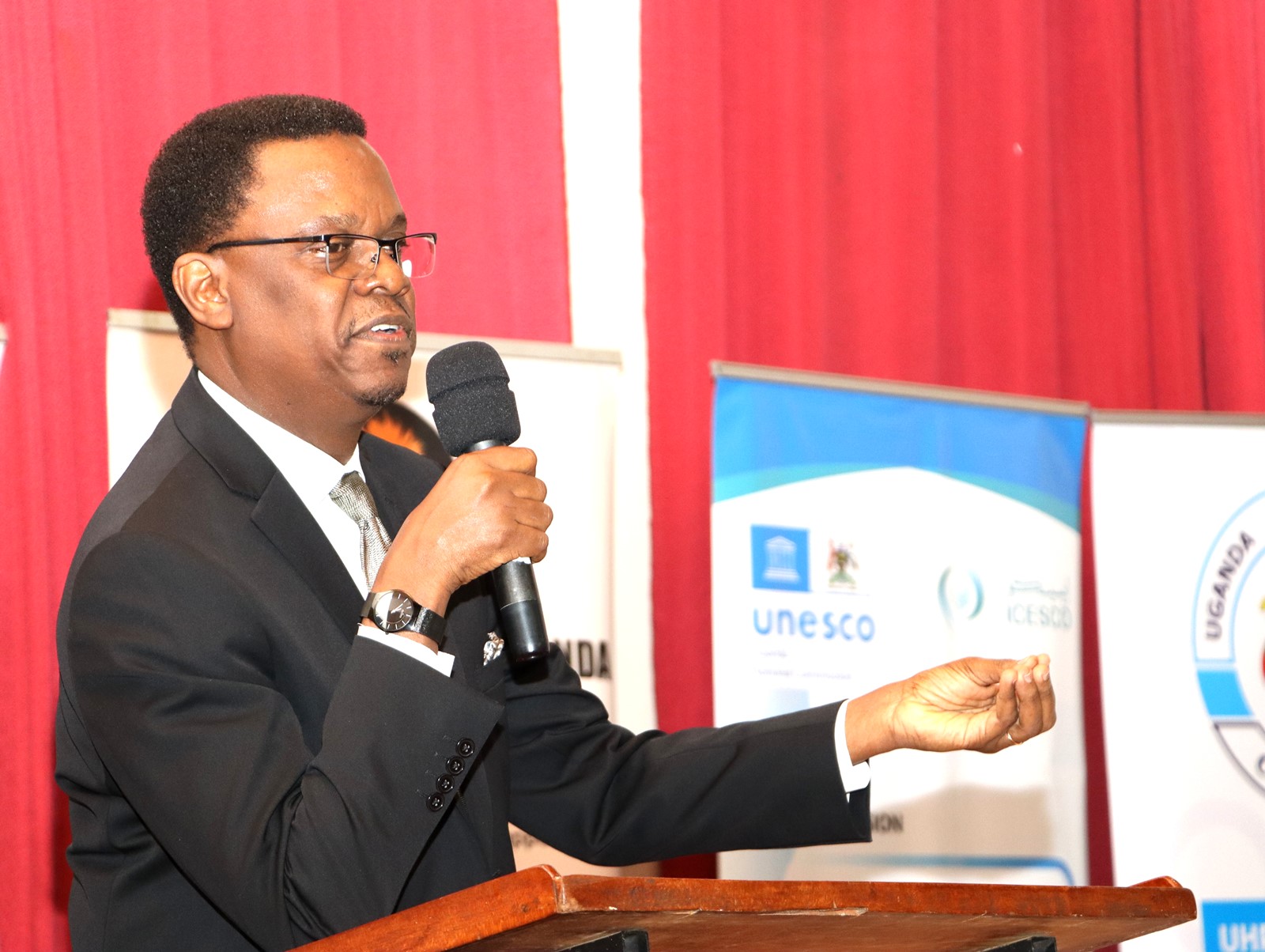
“We must defend the truth,” Ekoju said, referencing recent incidents where journalists were assaulted and detained in Kawempe and Masaka. “Much as we condemn the battering of journalists, we must also recognize the more subtle assaults—brown envelopes, bias, and prejudice that threaten journalistic integrity.”
Ekoju warned against the “adulterated media landscape,” saying it is now saturated with misinformation, citizen journalism, and a loss of public trust in legacy media. “In this digital age, everyone is a journalist. But not everyone is trained to report with sensitivity and accuracy,” he noted.
He revealed that the government, through the Ministry of ICT, is working on new media legislation to address emerging challenges, including defining professional journalism, regulating misinformation, and ensuring media freedom in the digital era. The proposed law is expected to be shared with stakeholders before enactment.
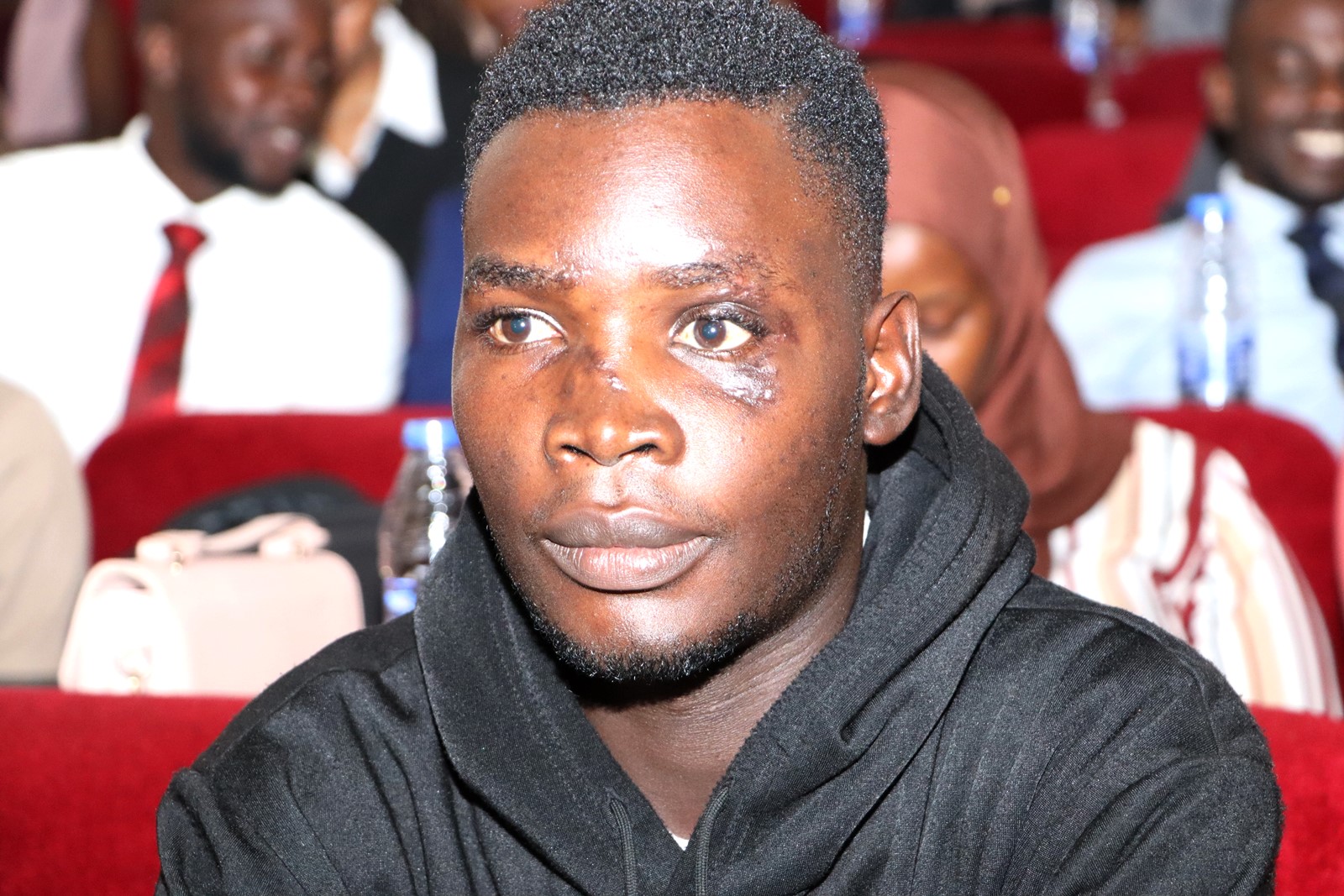
Drawing on a French proverb, Ekoju reminded attendees that while journalists should always seek the truth, they must exercise wisdom and responsibility in its dissemination. “Everything you say should be true, but not everything true should be said,” he remarked.
The event also highlighted the role of journalism students in shaping a more ethical media future. Dr. Aisha and Dr. Tayebwa, both faculty at the university, were recognized for mentoring upcoming reporters.
“In a world of spin and distortion, we need journalists to be the bearers of fact and clarity,” Ekoju concluded, urging the media fraternity to remain professional, united, and engaged with stakeholders as the country heads into an increasingly polarized electoral season.
We Must Defend Press Freedom Amidst Rising Misinformation-Tayeebwa
Dr. William Tayeebwa, representing the Head of the Department and acting as host, delivered opening remarks that highlighted the urgent need to protect journalistic integrity.
“These are perilous times,” said Dr. Tayeebwa. “What happened in Masaka yesterday, the treatment of journalists—anyone who saw it would understand the gravity of the challenges we face. As an academic institution, we recommit ourselves to engaging with all our partners to uphold media freedom the best way we can.”
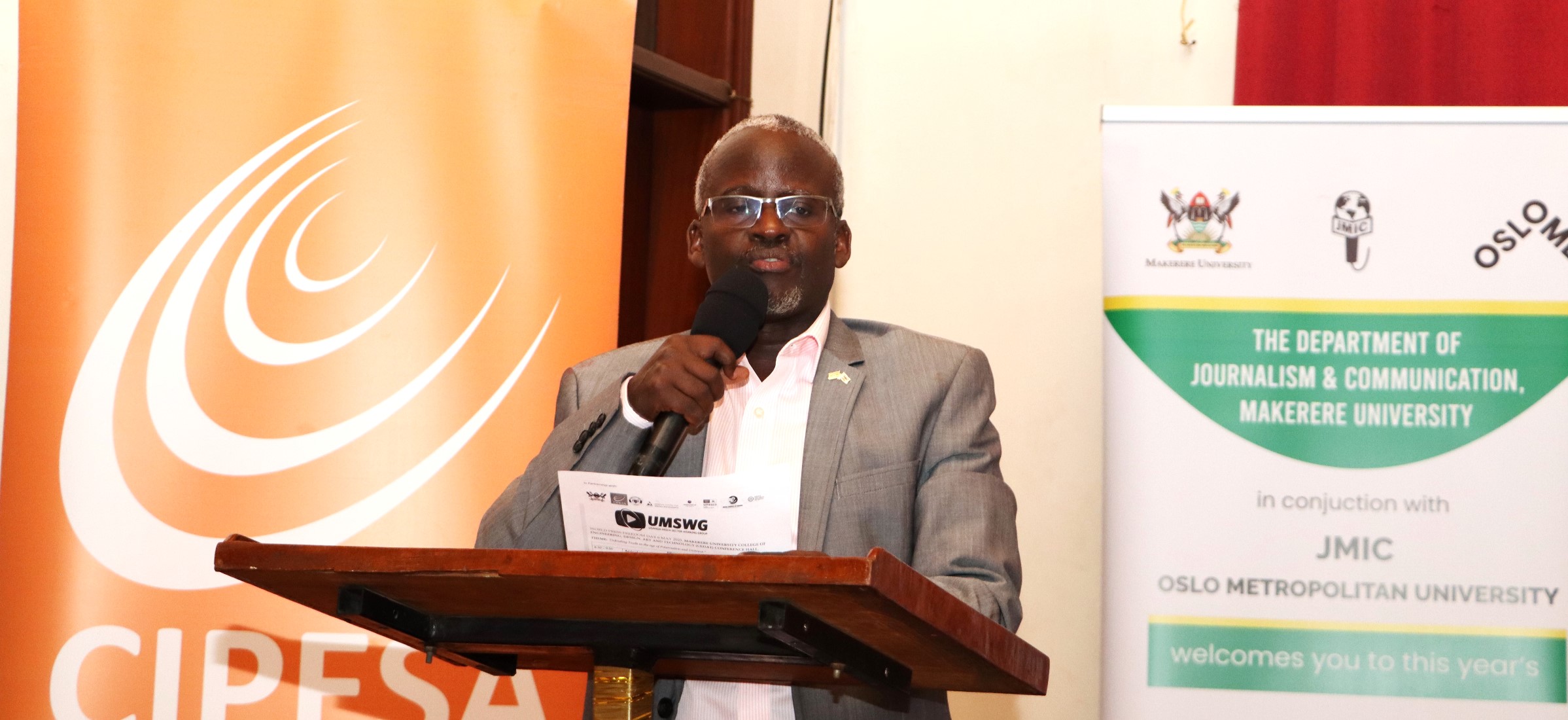
Dr. Tayeebwa acknowledged a number of long-standing partners, including CIPESA, Oslo Metropolitan University, the Uganda Human Rights Commission, the African Centre for Media Excellence, UNESCO, the Uganda Media Council, and Media Focus on Africa. “These partners,” he said, “have walked this journey with us, and we’re grateful for their continued support.”
Also recognized were key public figures expected to contribute to the discussion, including UPDF spokesperson Felix Kulayige, Executive Director of the Uganda Communications Commission, and Julius Mucunguzi, spokesperson of the Electoral Commission. Students from the department, despite being in the midst of examinations, also attended in notable numbers.
Dr. Tayeebwa emphasized the department’s evolution, hinting at a forthcoming transition to a fully-fledged School of Journalism and Communication, and called on professionals to frequently return as guest lecturers. “Let’s not only meet at events like this,” he urged. “If you have something important to share with our students, our doors are open.”
Uganda Human Rights Commission Reaffirms Commitment to Press Freedom
The Uganda Human Rights Commission pledged continued support for the protection of press freedom and the promotion of responsible journalism, particularly as the country approaches the 2026 general elections. This reassurance was delivered by Commissioner Lamex Omara Apitta, who represented the Commission Chairperson, Hon. Mariam Wangadya, at the national commemoration of World Press Freedom Day held at Makerere University.
Speaking to to the gathering, Omara emphasized the urgent need for collaboration across all sectors to uphold journalistic integrity amid increasing threats.
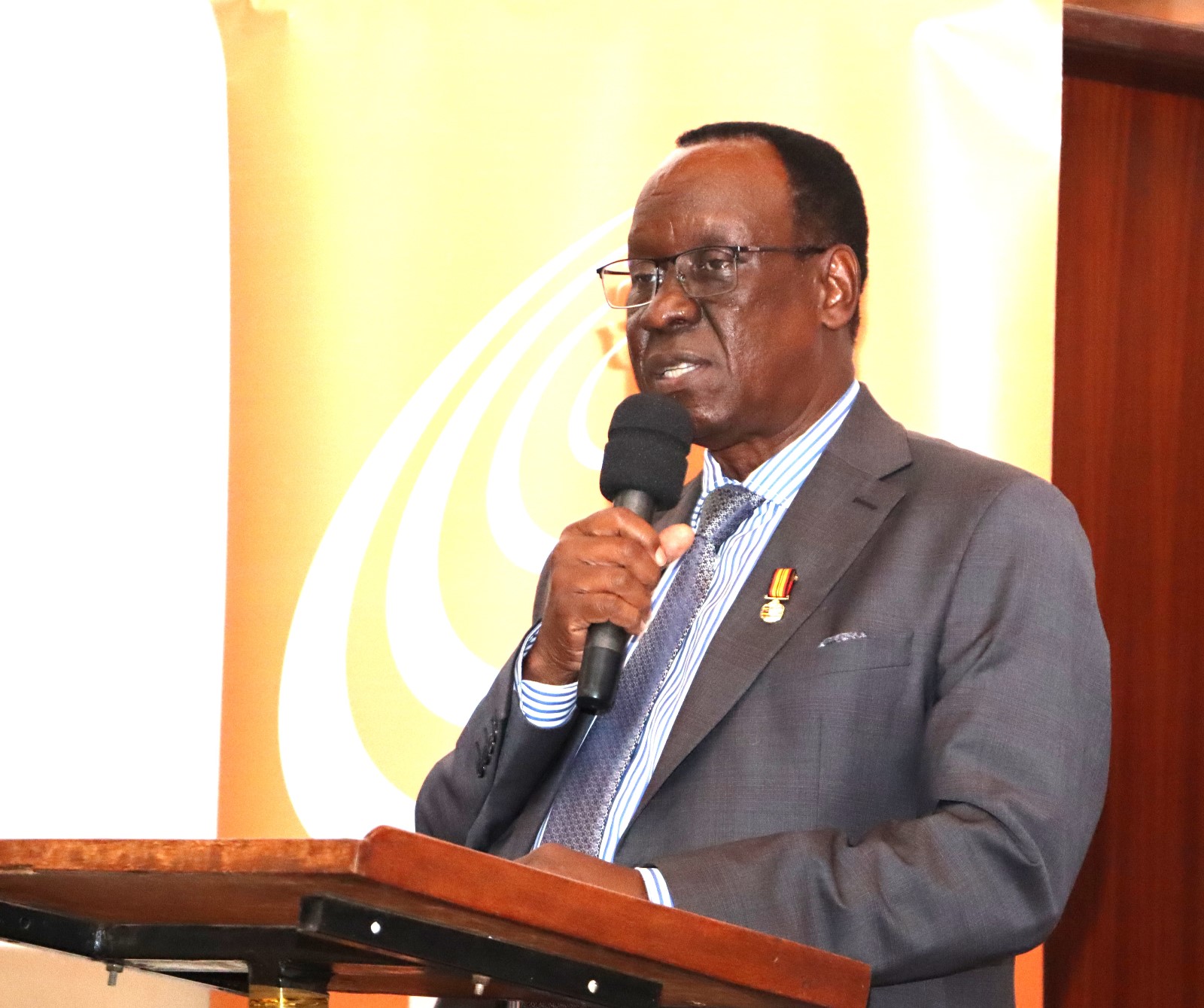
“This year’s theme, Defending Truth in the Age of Polarization and Distrust, highlights the growing challenges faced by journalists from financial pressures and public skepticism to political interference and digital threats like misinformation and AI-driven surveillance,” said Omara.
He underscored that the Uganda Human Rights Commission is actively engaged in advocating for human rights-based media policies, monitoring violations of press freedom, and working with security agencies through training and dialogue to ensure journalists’ safety.
As Uganda prepares for its next general elections in 2026, the role of the media in promoting transparency and accountability is more vital than ever, he noted. “From election organizers to observers, the role of journalism in credible elections cannot be overstated. We call on all actors to support media practitioners in fulfilling this constitutional mandate.”
Omara also highlighted the Commission’s efforts to equip journalists through targeted trainings and reinforced the need for early coordination between the media, civil society, and government institutions in the electoral process.
He further praised the organizers of the event held under the Uganda Media Sector Working Group and thanked partners including the African Centre for Media Excellence, UNESCO Uganda, Prowesa East Africa, Media Council of Uganda, and Makerere University’s Department of Journalism and Communication.
“This gathering must not end with speeches,” he urged. “Let it be a launchpad for concrete strategies and joint actions that protect and expand press freedoms in Uganda.”
UNESCO Representative Calls for Protection of Media Freedom, Cites Growing Threats Ahead of Uganda’s 2026 Elections
Daniel Kawesi, Assistant Secretary General for Culture at the Uganda National Commission for UNESCO, issued a strong call for protection of press freedom and freedom of expression, warning of escalating threats to journalists and media practitioners in the country.
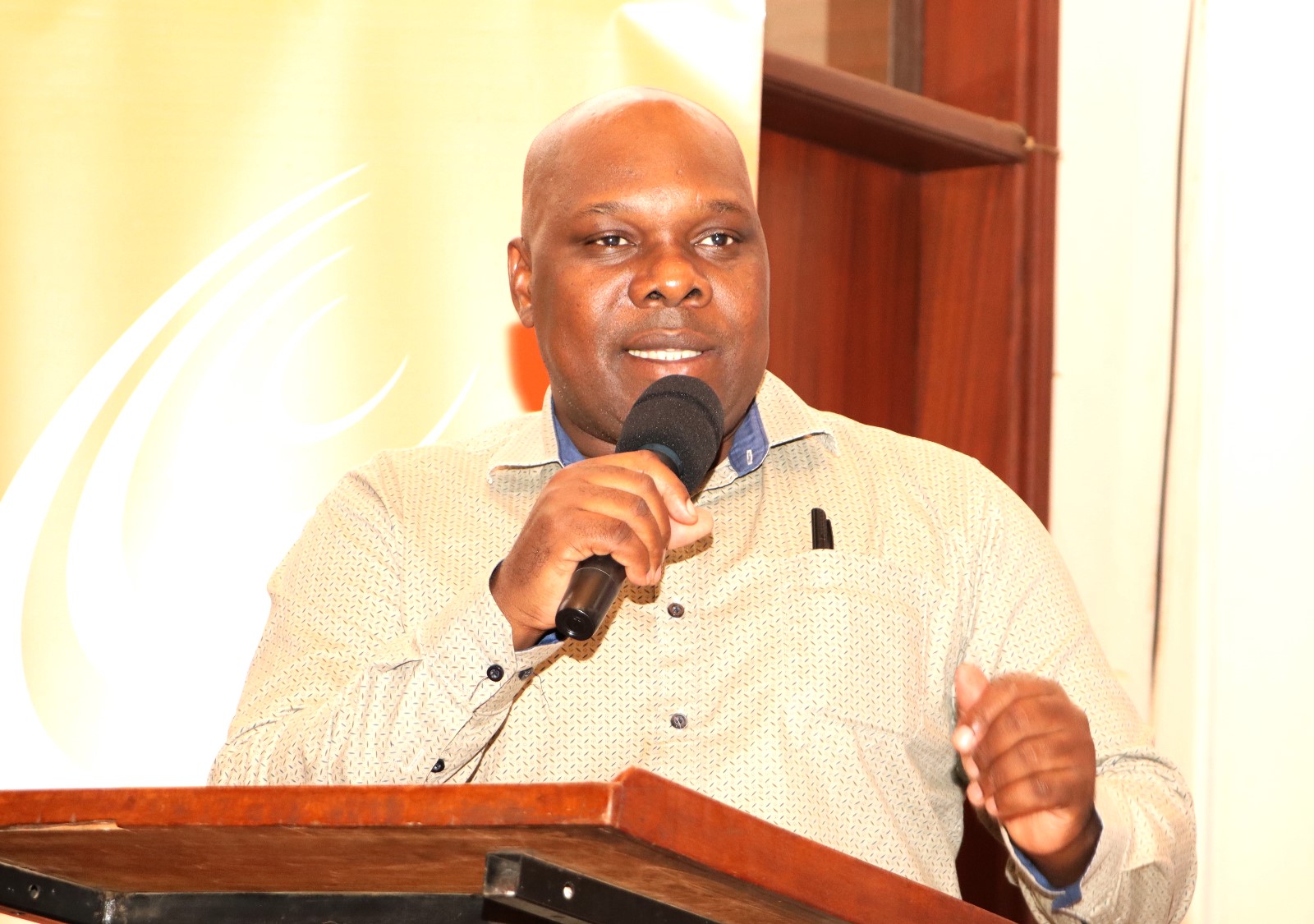
Kawesi emphasized the media’s indispensable role in sustainable development and democratic accountability. He was representing the Secretary General of the Commission.
“The violence we’ve seen from the 2009 Kayunga riots to the 2021 general elections and the recent by-elections is not just a coincidence,” Kawesi said. “Journalists have paid a heavy price for simply doing their work. And the picture being painted for the 2026 elections is not any more promising.”
Linking national and international concerns, Kawesi drew attention to the dual themes of this year’s World Press Freedom Day: “Defending Truth in the Age of Polarization and Distrust” and “The Impact of Artificial Intelligence on Press Freedom and Media Independence.” He warned that growing distrust, misuse of AI technologies, and shrinking civic space threaten both traditional journalism and democratic discourse.
He called on law enforcement, the military, the judiciary, and policy makers to create an enabling environment that upholds freedom of expression and guarantees journalists’ safety. “When freedom of expression disappears, media freedom disappears with it,” he added.
Kawesi also urged stakeholders to remain vigilant throughout the year, not just on commemorative occasions. “These themes must guide our actions, policies, and partnerships—not just today, but every day until we return here next year.”
He praised civil society and development partners for their continued support in celebrating and defending press freedom since UNESCO first designated May 3 as World Press Freedom Day in 1993. He concluded by encouraging attendees to consult the official message from the UNESCO Director-General for a broader global perspective on the issue.
Uganda Media Sector Working Group Urges Inclusive Dialogue on Press Freedom Ahead of 2026 Elections
Charles Bichachi, a leading voice in Uganda’s media industry, emphasized the need for inclusive, sustained dialogue around media freedom and governance as the country heads into a critical election cycle. Bichachi addressed attendees on behalf of the Uganda Media Sector Working Group (UMSWG), the event’s chief organizer for the fifth consecutive year.
Bichachi briefly outlined the mission and structure of the UMSWG, describing it as a multi-sectoral platform created to bring together all stakeholders in the media ecosystem—from journalists, media owners, and academics to government regulators, advertisers, and civil society actors.
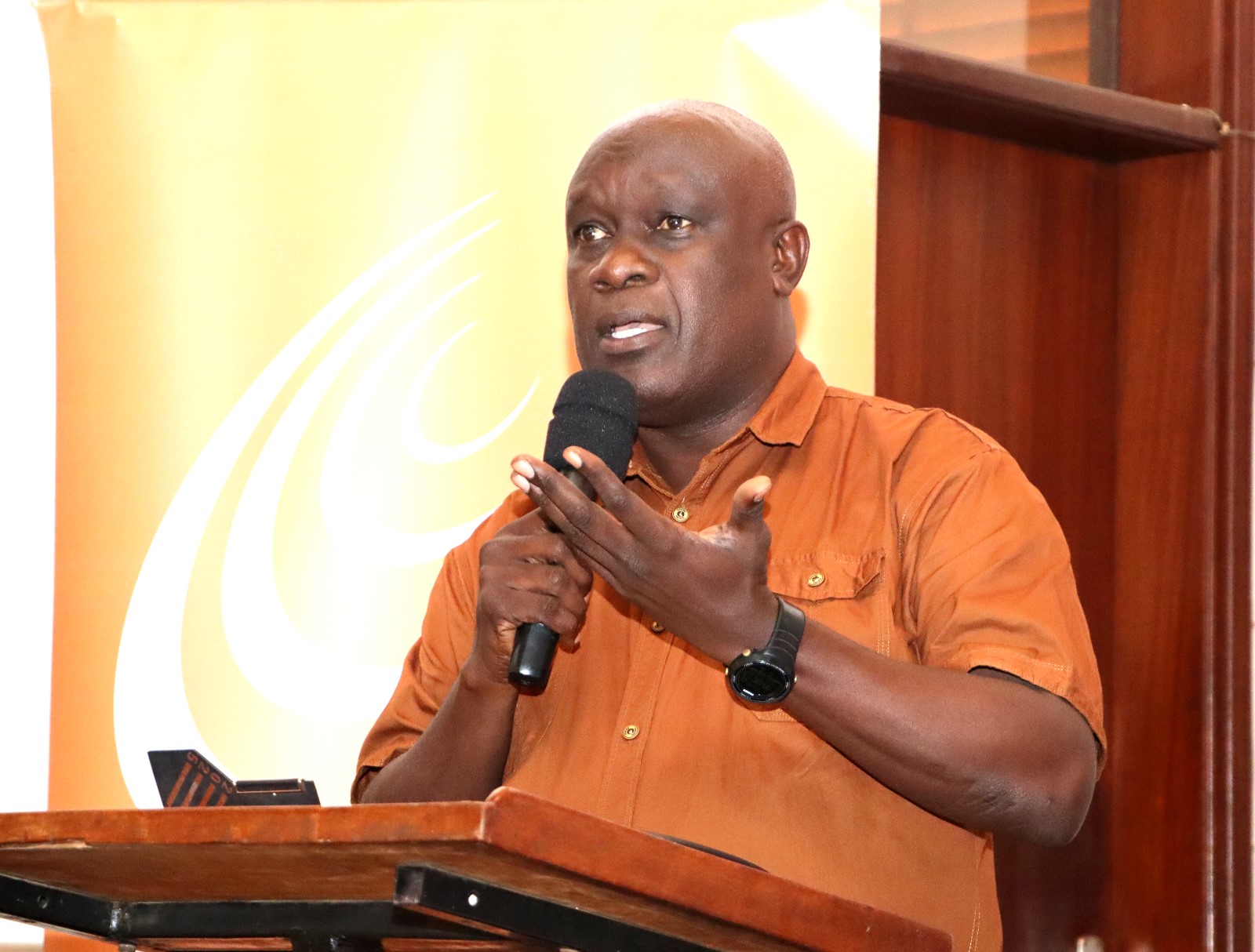
“Many times when we talk about the media, we focus only on journalists and journalism students,” Bichachi said. “But the media includes the people we write about, those who consume it, and those who invest in it. It is a public space, and we must all take responsibility for its health and sustainability.”
The UMSWG, now composed of over 20 member organizations, was established five years ago to address growing polarization within Uganda’s media landscape and to push for reforms around media regulation, sustainability, and professionalism. Its collective approach has enabled diverse actors to engage in meaningful conversation on how to strengthen journalism in Uganda.
With Uganda’s 2026 general elections fast approaching, Bichachi warned that the nation had already witnessed worrying signs of repression, referencing recent media harassment during the Kawempe by-election.
“This is not just a pre-election year—it is an election year. The voting may happen in early 2026, but the political activity is already in full swing,” he noted. “It is a critical moment to reflect on how we can protect and strengthen press freedom during this time.”
Bichachi thanked the media sector partners, including UNESCO, Makerere University, the Uganda Human Rights Commission, and various civil society groups, for their continued collaboration in advancing media freedoms. He called on all stakeholders especially those in government to uphold their roles in ensuring a safe and functional media space for the benefit of democracy.
Ugandan Lawyer Urges Media Unity and Accountability
Counsel Philip Karugaba, a leading Ugandan lawyer and advocate for media freedom, called on journalists, civil society, and Ugandan citizens to protect the integrity of the nation’s democracy ahead of the 2026 general elections. Karugaba delivered a stark warning about the deepening polarization, growing institutional mistrust, and the dangers of voter apathy, all of which he believes threaten to undermine Uganda’s democratic processes.
Karugaba, speaking under the theme “Defending Truth in an Age of Authoritarianism and Distrust,” began by honoring Ugandan journalists who, despite facing severe risks, continue to serve as frontline defenders of democracy. “The scars of journalists tell stories of courage,” he remarked, pointing to the ongoing dangers faced by reporters covering elections, especially in volatile environments. He emphasized that the violence directed at journalists during the recent Kawempe North by-election—where media professionals were attacked serves as a reflection of Uganda’s broader crisis of governance.
He condemned the violence that turned what should have been a peaceful civic exercise into an atmosphere of terror. He asserted that the violent scenes at polling stations, as well as the assault on journalists, exposed the lack of protection for media workers and citizens during the electoral process, raising questions about the true nature of Uganda’s democracy.
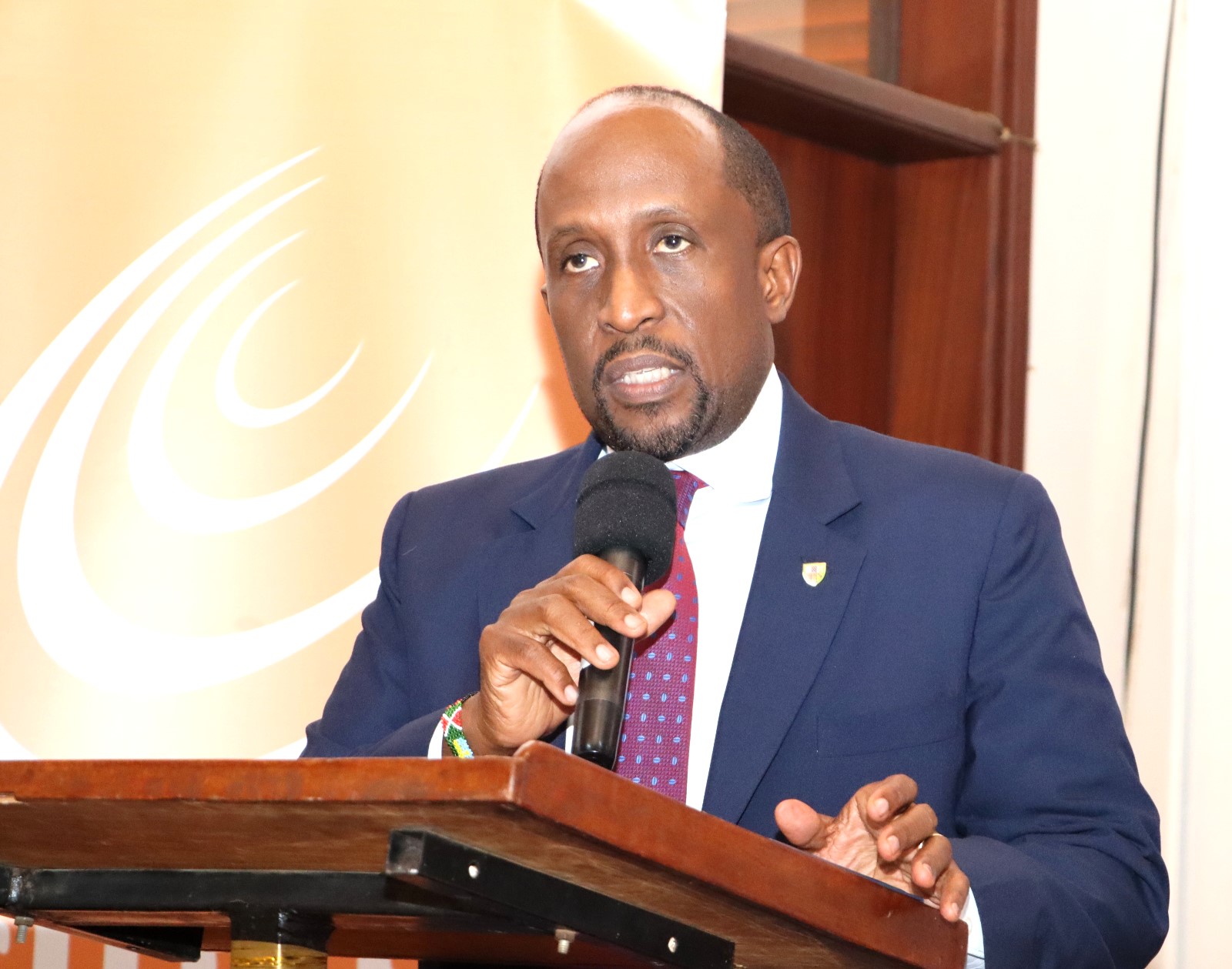
Despite these unfortunate events, Karugaba remained hopeful that polarization, if approached correctly, could increase citizen participation in the electoral process. He cited the Uganda Law Society’s recent elections, which saw the highest voter turnout in history, as evidence that even in highly polarized environments, the desire for democratic engagement can be a powerful force.
A Call for Accountability
Karugaba’s speech centered around three crucial steps he believes will be vital in protecting the truth, fostering media freedom, and ensuring fair elections. The first step, he argued, is accountability. He strongly condemned the assault on journalists during the Kawempe North election and called for a thorough, transparent investigation into the attacks. “Laws like the Press and Journalists Act must be reformed to align with the constitutional promise of free expression,” he said, underscoring that journalists must be protected, not punished calling for justice in these matters as a means of reinforcing the rule of law.
Empowering the Media
The second step Karugaba highlighted was empowerment. He stressed that for journalists to effectively cover elections and hold power to account, they must have access to adequate resources, training, and safety measures. “Taking precaution is not cowardice,” he said, referencing a personal experience during a security drill that had turned into a tense situation with gunfire. He pointed out that journalists in Uganda need more than just legal protection; they need safety training, risk assessments, and the tools to do their jobs in potentially dangerous environments. “Journalists covering elections should be equipped to protect themselves,” Karugaba emphasized, calling on media organizations to prioritize the safety and well-being of their teams.
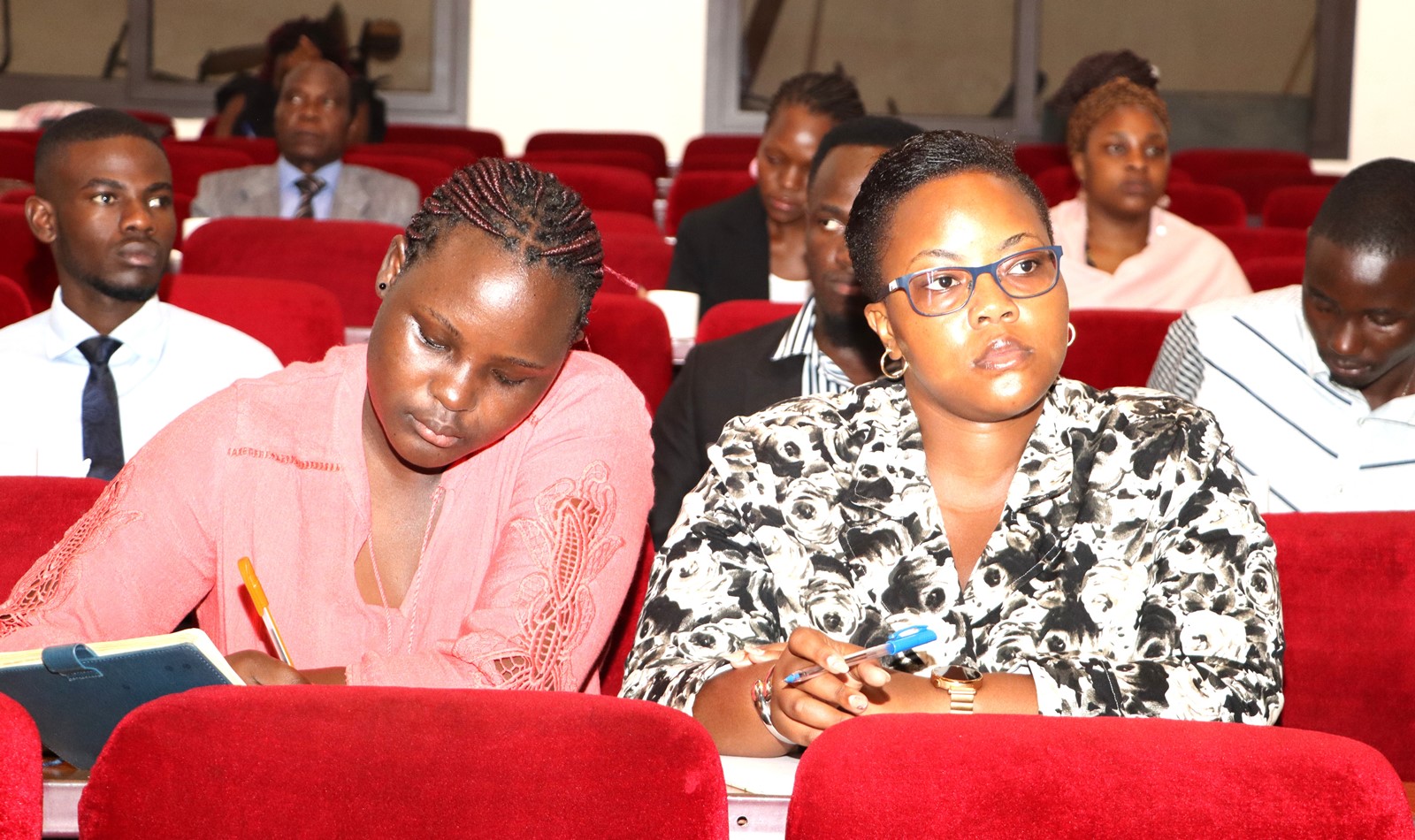
In this regard, Karugaba encouraged media houses to forge alliances with institutions like the Uganda Law Society and the Uganda Medical Association. These partnerships, he argued, would ensure that injured journalists receive proper medical attention and legal support, fostering a safer environment for them to work in.
Fostering National Unity
The final step Karugaba proposed was unity. He noted that the fight for media freedom is not just a journalist’s concern, but a national one. “When we vote in 2026, we must ask ourselves: Which leaders will protect the press?” he challenged the audience. He encouraged Ugandans to reject self-censorship, embrace open debate, and stand in solidarity with the media. Karugaba also urged the public to focus on shared national goals, such as job creation, health, and peace, which transcend political divides. He called on media houses to run campaigns that unite citizens around these common aspirations, rather than fueling further division.
A Final Plea for Truth
Concluding his address, Karugaba called for an active and engaged citizenry, urging Ugandans to report fearlessly, verify information relentlessly, and hold their leaders accountable. He invoked the words of Nelson Mandela, who famously stated that a critical press is the “lifeblood of democracy.” For Uganda’s democracy to thrive, he emphasized, journalists, citizens, and regulators must all play their part in defending the truth.
“We must write our future with bold and fearless headlines,” Karugaba concluded, “where truth, unity, and democracy take precedence.”
Two Veteran Journalists and Makerere Youth Honored for Outstanding Contribution to Uganda’s Media
Three prestigious journalism awards were presented by the Uganda Media Sector Working Group to honor outstanding contributions to the development of media and press freedom in the country. The recipients included two towering figures in Ugandan journalism Dr. Zadok Ekimwere and Mr. Drake Ssekeba—as well as a spirited youth team from Makerere University, recognized for their compelling performance in an inter-university media debate.
The awards, which recognize cumulative impact on journalism rather than specific stories or publications, are uniquely designed to spotlight individuals and institutions that have shaped Uganda’s media landscape over time. Previous honorees have included institutions such as UMCAT and UMWA (Uganda Media Women’s Association), veteran journalists like Charles Zziwa, and even unsung heroes like a newspaper vendor who sold newspapers every day for over 20 years—walking nearly 10 kilometers daily. “That’s the kind of dedication that often goes unnoticed in the newsroom,” remarked Charles Bichachi one of the organizers.
Dr. Zadok Ekimwere: From the Voice of Uganda to Training a Generation
The first journalism Lifetime Achievement Award went to Dr. Zadok Ekimwere, whose remarkable 40-year journey in Ugandan media began in the late 1970s. Fresh out of Makerere University in 1977, he joined the Voice of Uganda then infamously dubbed “Voice of Amin” as a features writer. He continued to serve under various regimes, writing for The National Mirror during the Uganda National Liberation Front era, and later moving to The New Visionin 1986, where he rose through the ranks as a sub-editor, features editor, and eventually training editor.
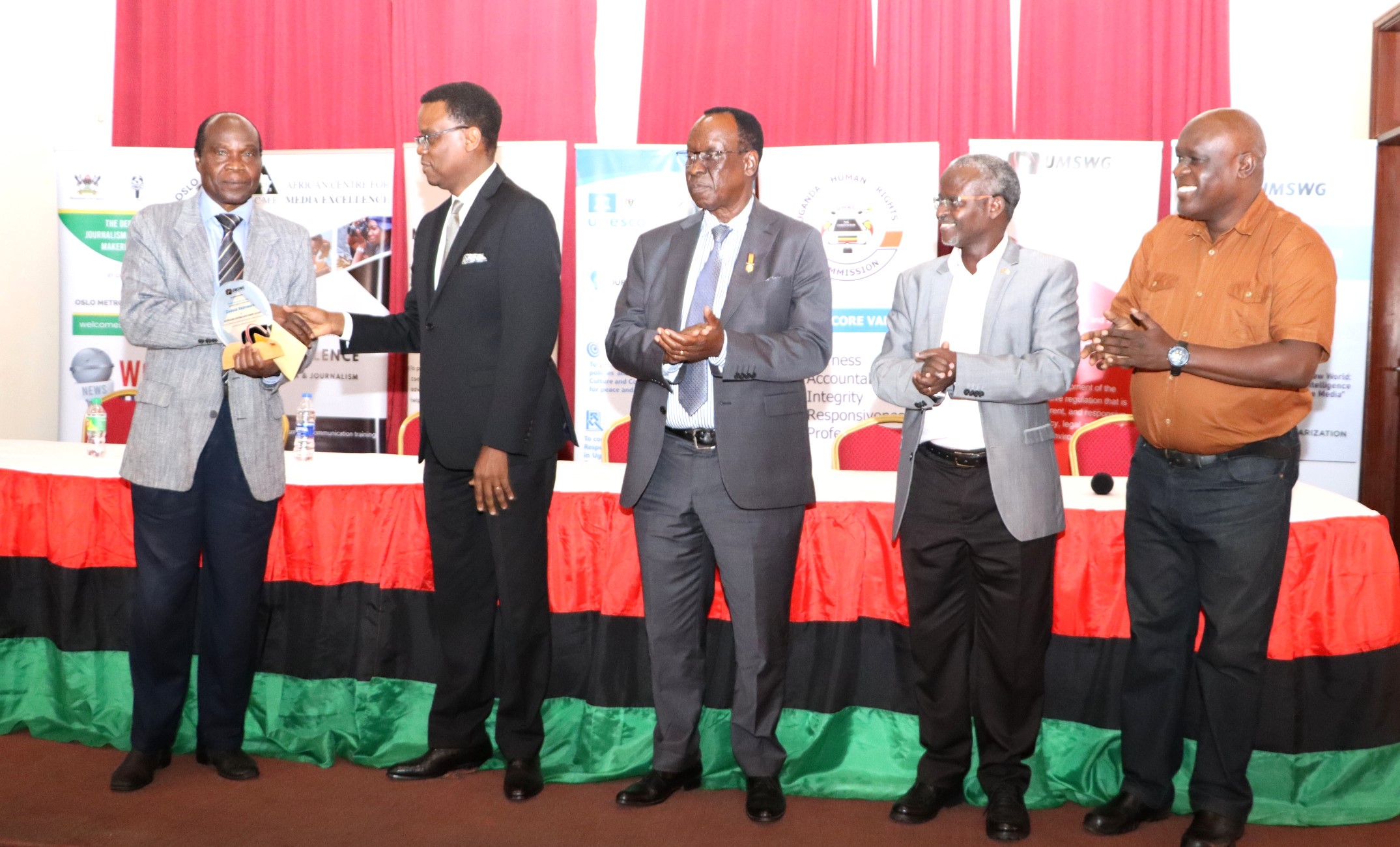
Ekimwere’s influence extended far beyond the newsroom. After earning a PhD in Journalism and Mass Communication from the University of South Carolina, he became a respected media trainer, serving briefly at Victoria and Ndejje universities before becoming Principal at UMCAT School of Journalism and Mass Communication between 2017 and 2018. He currently works as a media and communication consultant and remains active in journalism education at UMI.
Accepting the award, Ekimwere gave a poignant speech. “Journalism is not about freebies. I have never taken a bribe,” he declared. He shared stories of editorial resistance, including a moment when he defied orders from a superior to euphemize a currency devaluation. “I insisted on using the correct term devalued.’ I wasn’t sacked. Maybe I missed a promotion, but I was true to journalism.”
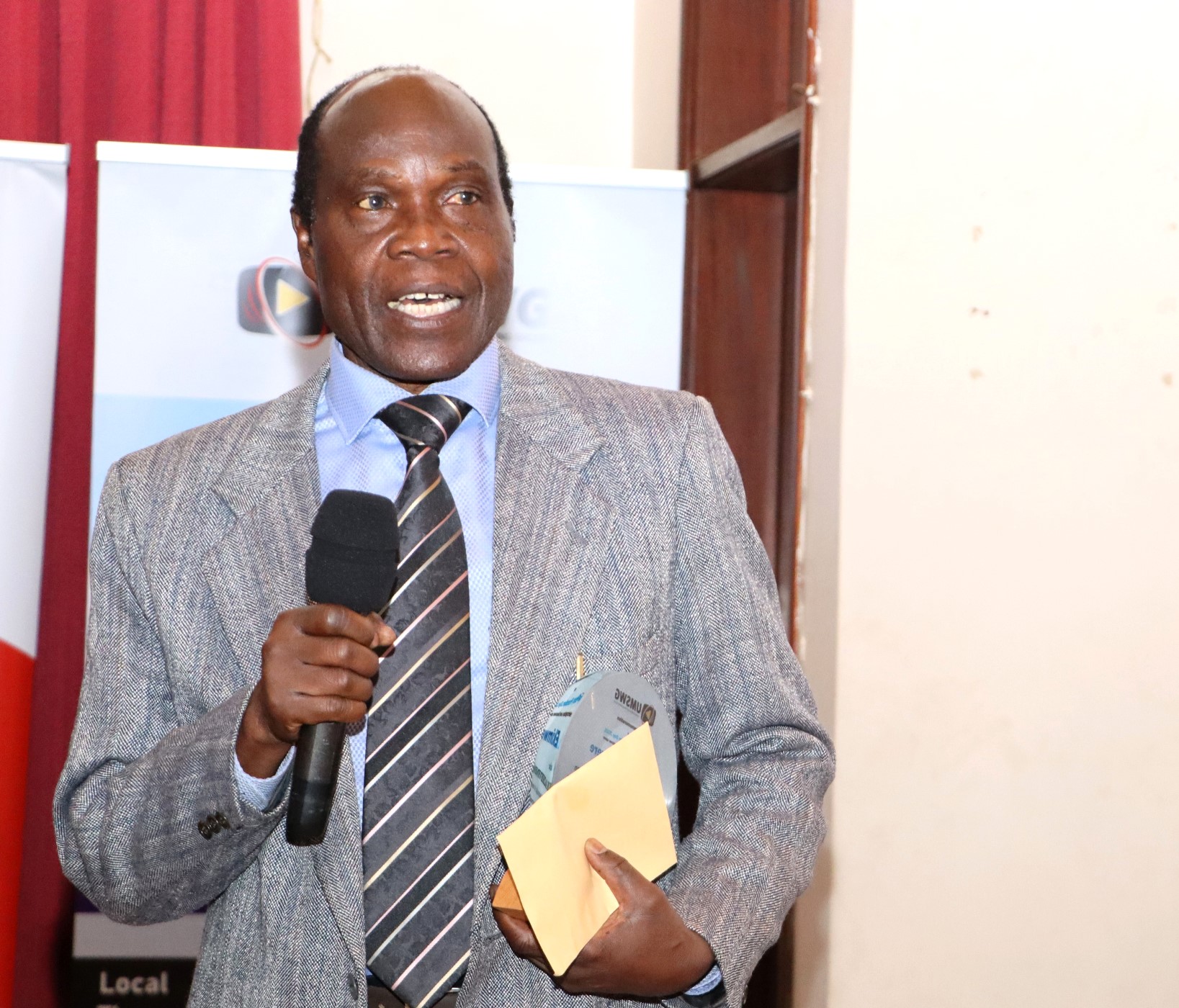
Ekimwere expressed deepest pride in the many young journalists he mentored over the decades. “Seeing them write, seeing them debate—I feel very honored,” he said.
Drake Sekeba: Six Decades of Fearless Reporting
The second Lifetime Achievement Award was bestowed upon Mr. Drake Sekeba, one of Uganda’s most enduring and widely respected journalists. His career began in 1965 as a trainee reporter at the Sekanyolya newspaper and would span some of the country’s most turbulent decades. Ssekeba worked with an array of historical newspapers Uganda Argus, The People, Munno, Ngabo, and The Star, among others and later became one of the first journalists to transition fluidly into broadcast.
Sekeba’s long career included dangerous run-ins with both Idi Amin’s and Milton Obote’s regimes, including detention without trial and an attempted shooting at a press conference. But he pressed on. In the early 2000s, he became a household name at WBS Television, producing and presenting widely popular programs such as Tulatogere, Motesana, and the long-running investigative series Vumbula.
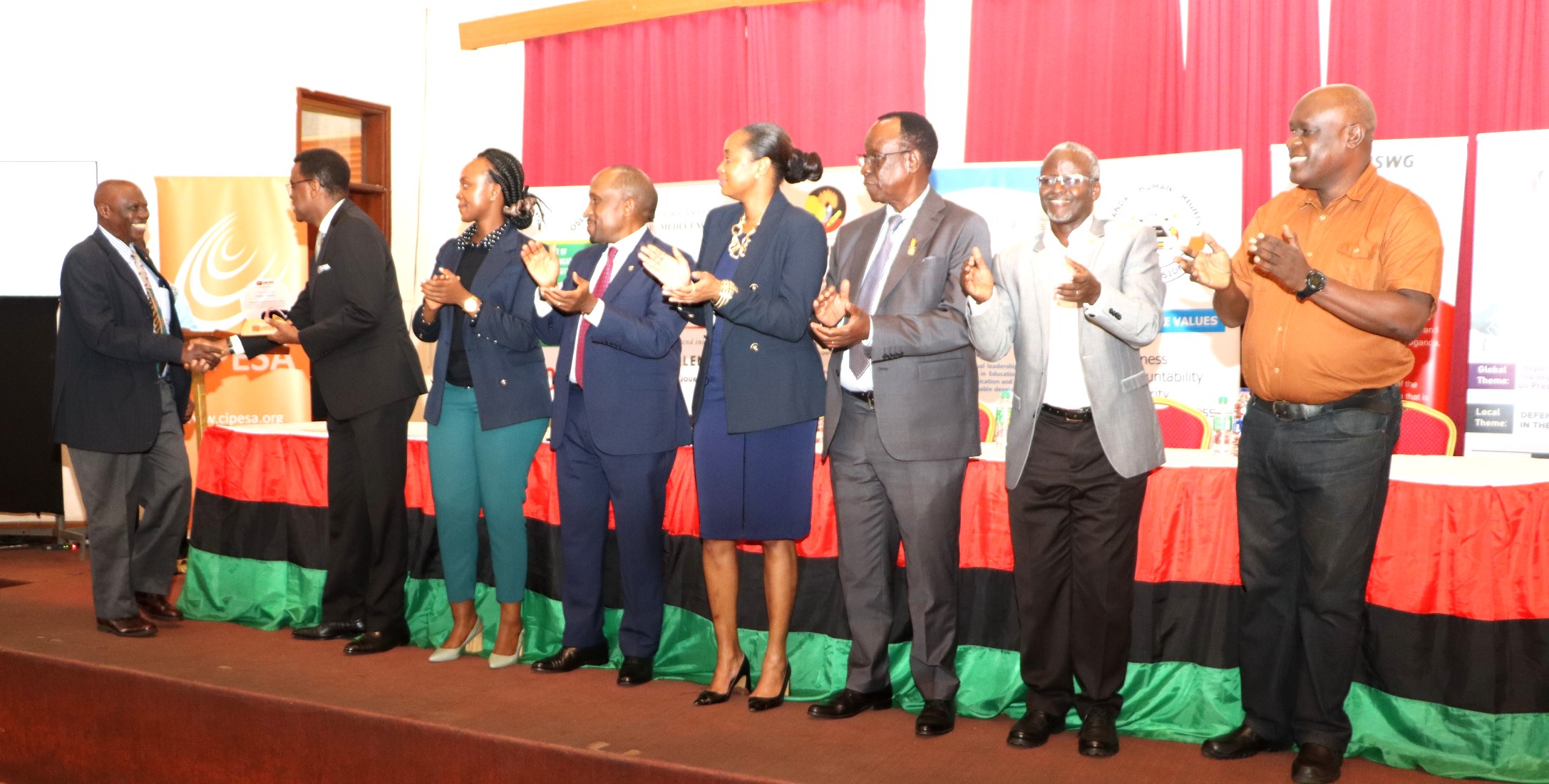
He is also a published author, with works like Media Bullets in Uganda: A Reference Guide to the History of Newspapers and their Role in Politics and the Church.
Visibly moved as he accepted his award, Sekeba said, “This is the first time I am getting a brown envelope—and for Jesus, it is the right time.” He reaffirmed his love for journalism and shared an anecdote about a minister once attempting to influence coverage. “I told my boss: I will give the minister good press—if I can interview the other side. And I did. Fair and balanced. That’s journalism.”
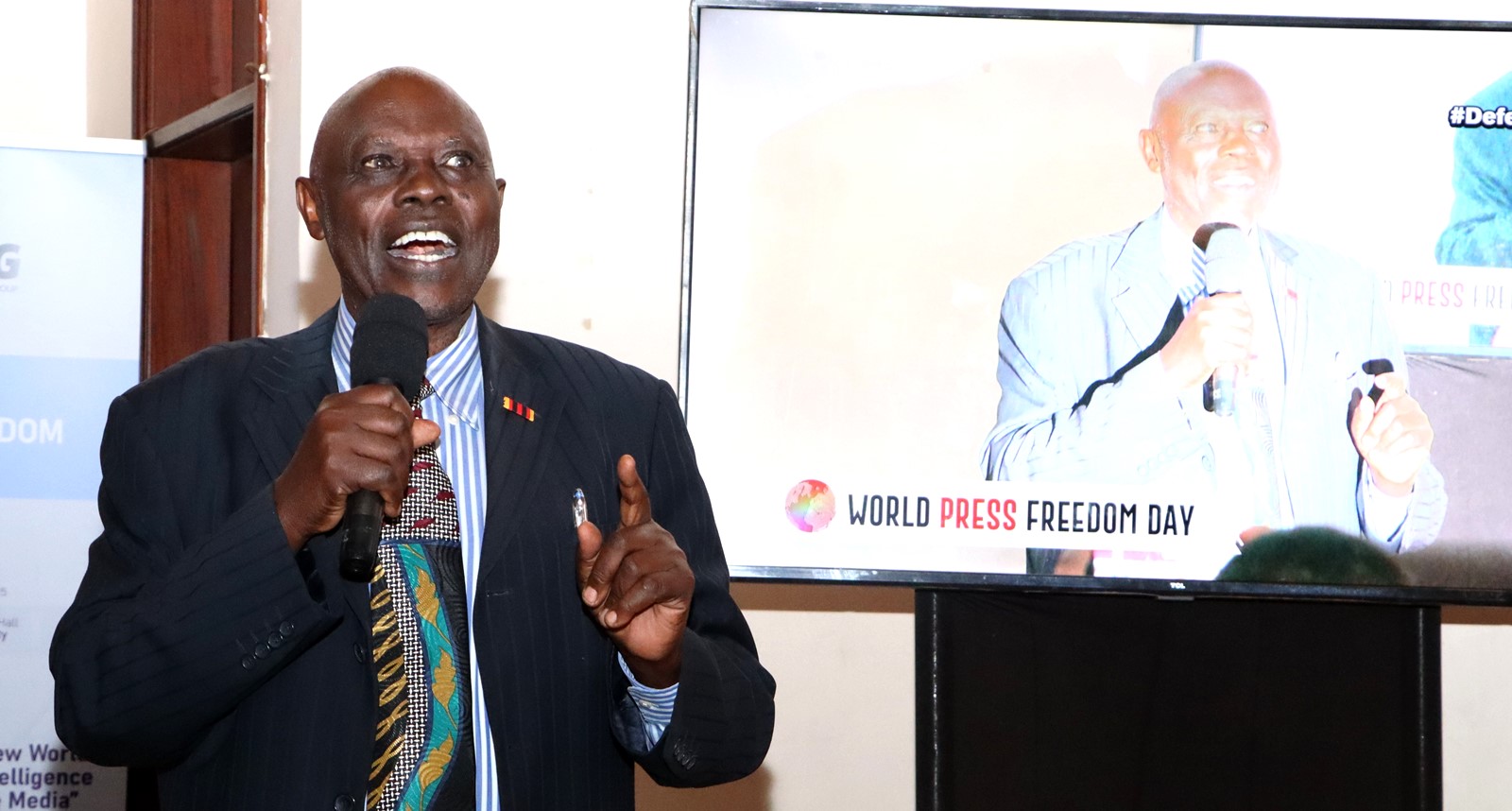
Makerere University Students Honored for Press Freedom Debate Victory
The final award celebrated the future of journalism—a vibrant student team from Makerere University, who won the Inter-University Media Debate hosted by the Media Challenge Initiative. The debate focused on the provocative question: “Has social media advanced or hindered press freedom?” and featured teams from Uganda Christian University, Kampala International University, and Makerere University.
Judged on depth, clarity, and understanding of media ethics, the students from Makerere emerged victorious after a spirited face-off with Uganda Christian University in the final round.
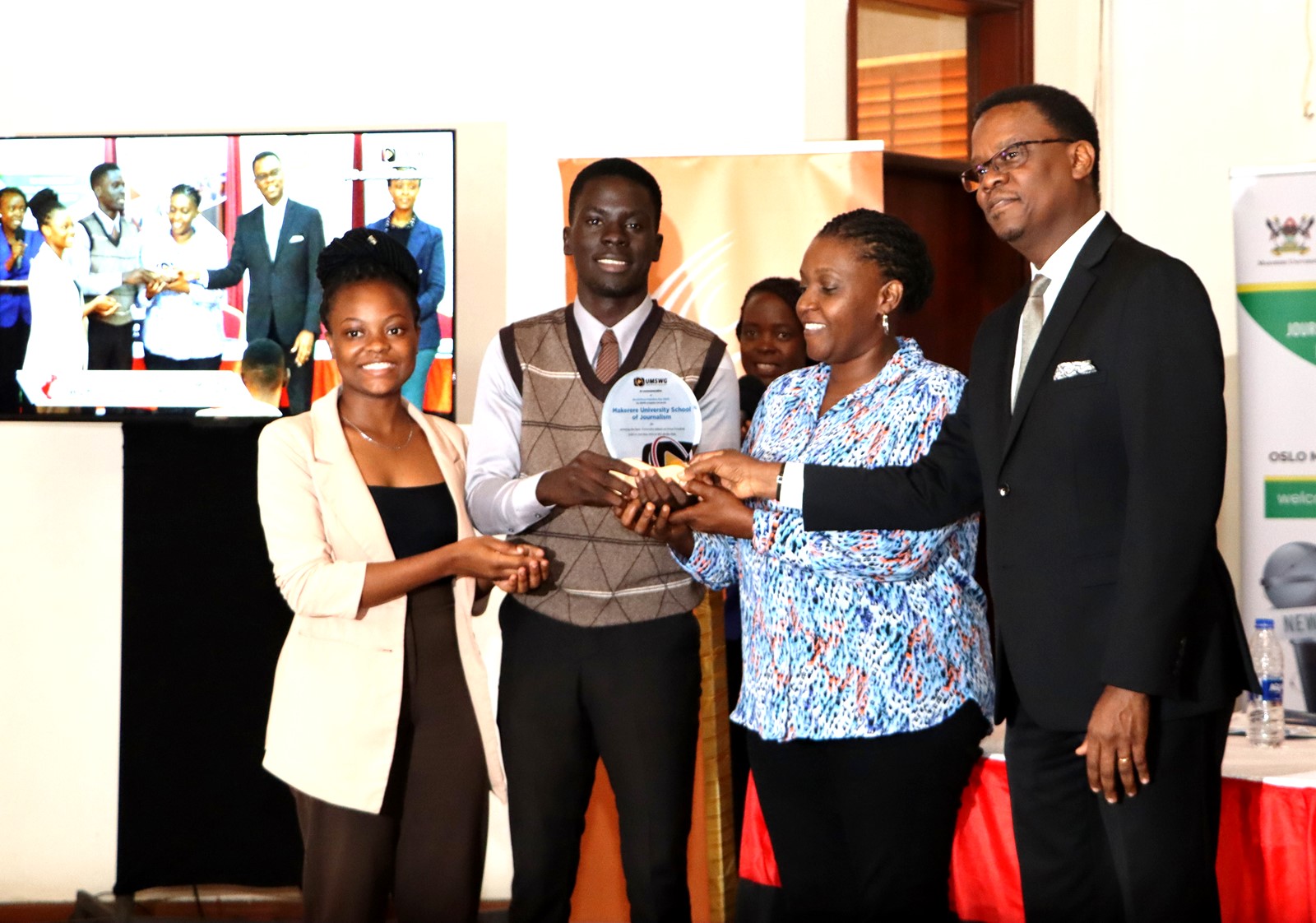
In their acceptance remarks, the students highlighted their commitment to truth and accountability. One student echoed George Orwell, saying: “Journalism is printing what someone else doesn’t want printed. Everything else is public relations.” Another added, “We’ve been told we are the leaders of tomorrow, but tomorrow is here. Our voices must rise above oppression. Our time is now.”
Jan Ajwang, a lead judge and member of the Uganda Media Sector Working Group, emphasized the importance of mentorship across generations. “The young can learn from the old—and the old can learn from the young,” she said.
The day closed with training sessions conducted by CIPESA on different media aspects in three breakaway venues on Online security, Misinformation and Fact Checking and, Physical security.
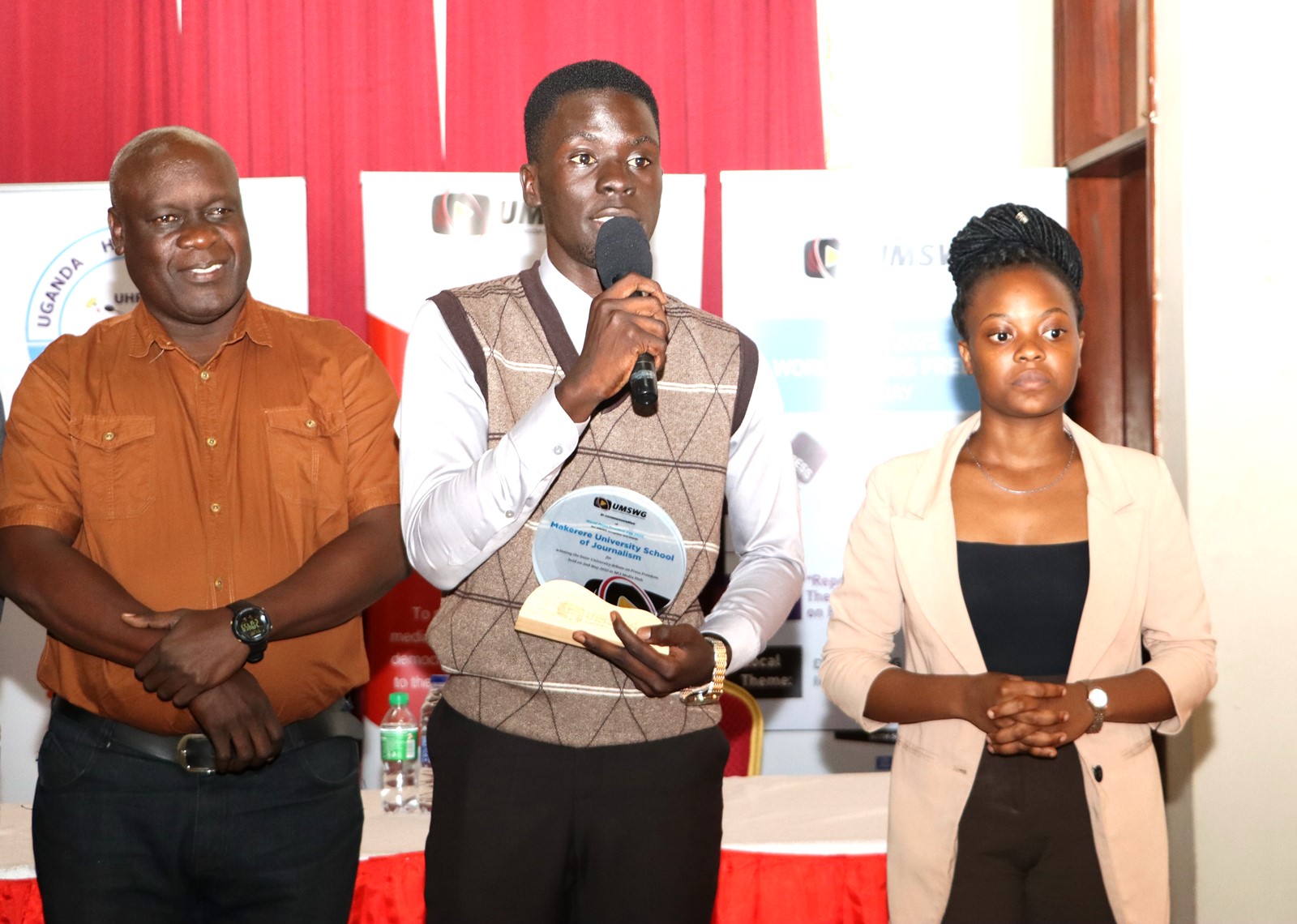
The 2025 Press Freedom Day celebrations not only honored legacy and longevity but also served as a bridge between generations. From the principled resistance of veteran journalists like Ekimwere and Ssekeba to the bold convictions of student debaters, the day underscored a unifying message: journalism in Uganda must continue to stand as a pillar of truth, justice, and public accountability.
“Whether you are 20 or 70,” said one attendee, “it’s clear—Uganda’s media still has heroes, and its future is still worth fighting for.”
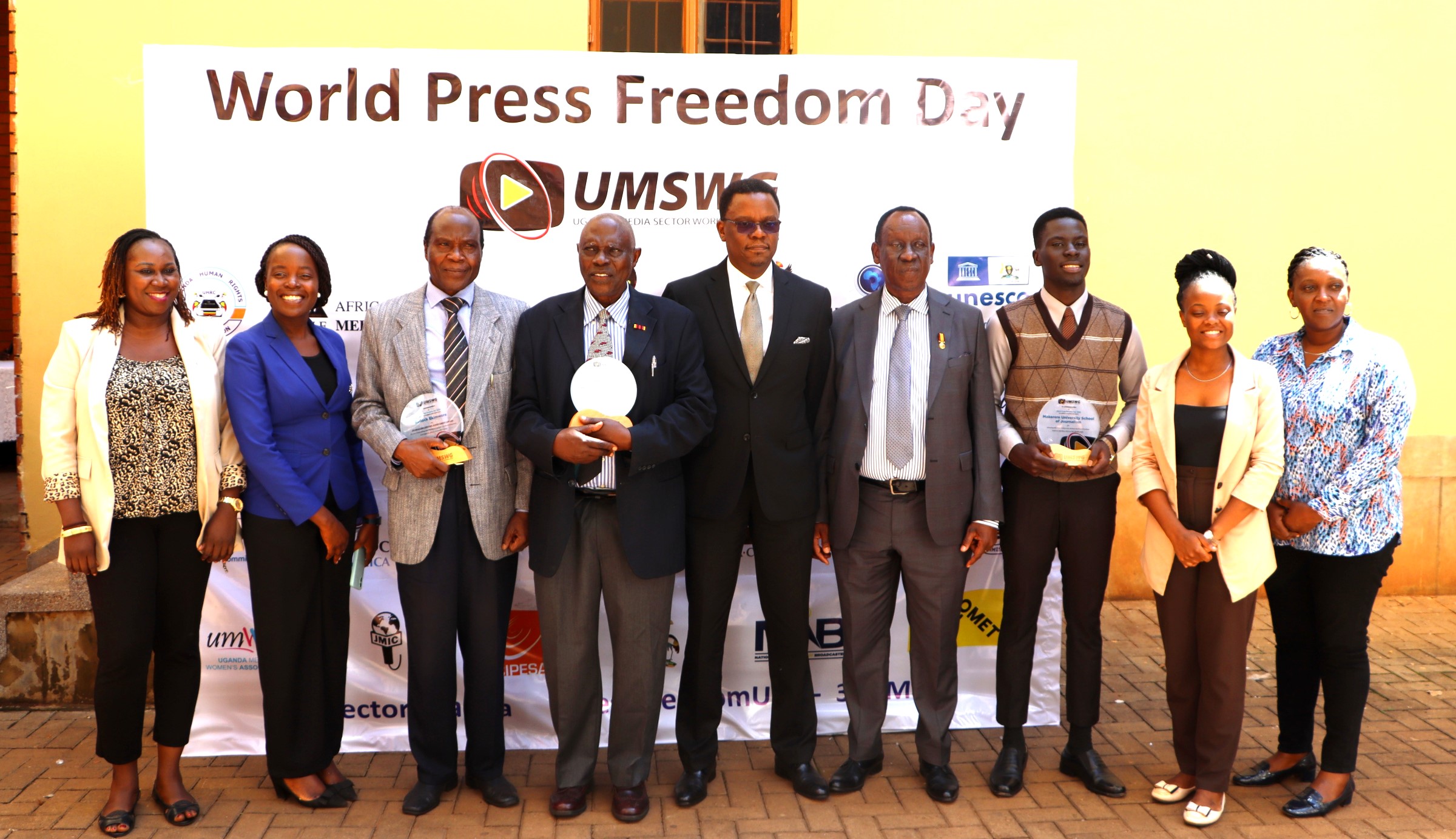
Jane Anyango is the Principal Communication Officer, CHUSS

You may like
-


Over 9,200 to graduate at Makerere University’s 76th Graduation
-


76th Graduation Highlights
-


Meet Najjuka Whitney, The Girl Who Missed Law and Found Her Voice
-


Makerere University School of Public Health Graduates First Cohort of Cost-Effectiveness Analysis Short Course
-


Climate variability found to shape malaria trends in Yumbe District
-


Mak hosts First African Symposium on Natural Capital Accounting and Climate-Sensitive Macroeconomic Modelling
Humanities & Social Sciences
Meet Najjuka Whitney, The Girl Who Missed Law and Found Her Voice
Published
2 days agoon
February 23, 2026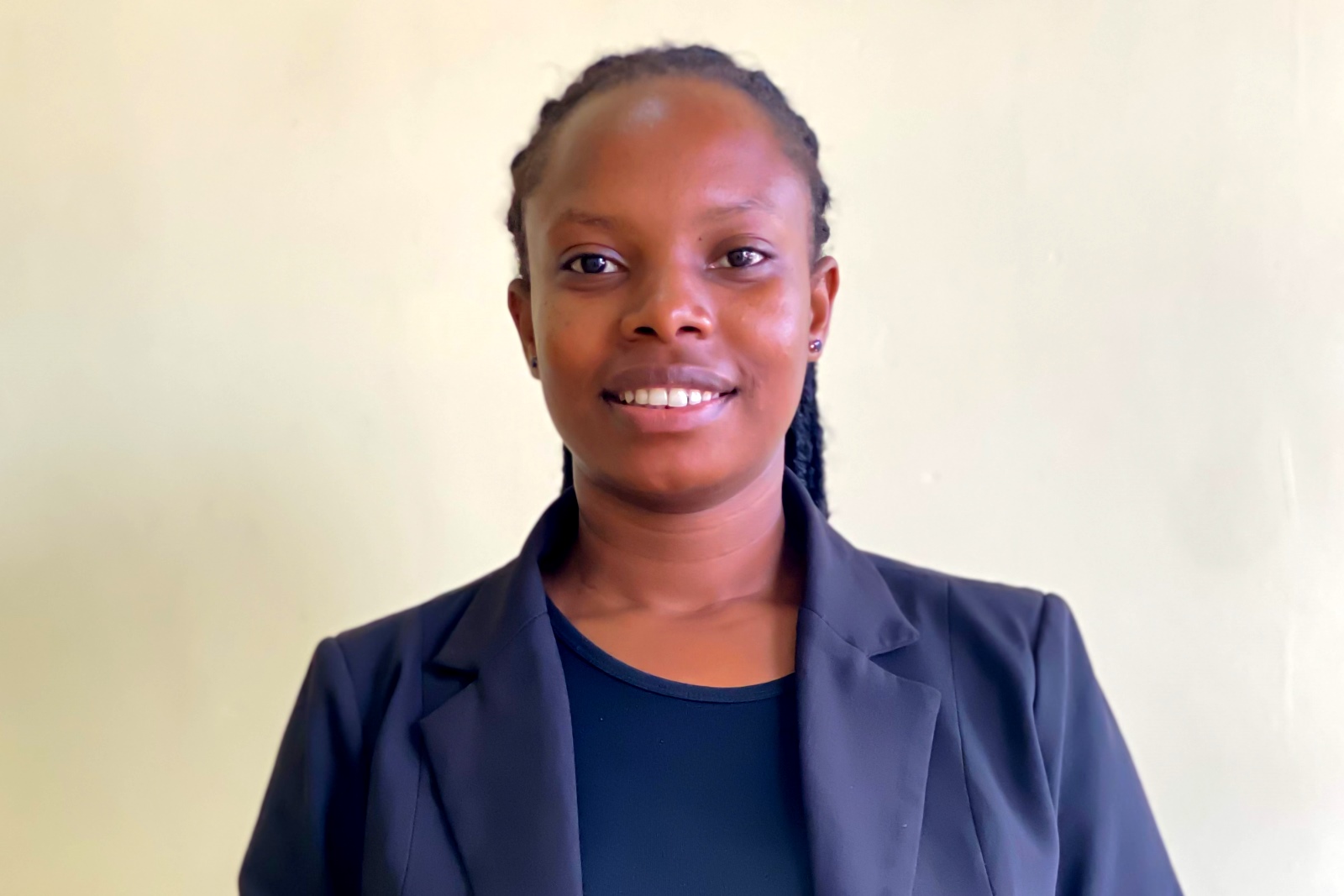
On the morning of Friday, February 27, when the academic procession winds its way across Makerere University’s Freedom Square for the last day of the 76th Graduation Ceremony, Whitney Najjuka will walk into history with a number beside her name: 4.46.
At Makerere, that number means First Class Honours. It means the Vice Chancellor’s List. It means she graduates as the only First-Class student in Journalism and Communication this year. But numbers, as Whitney has learned, rarely tell the full story.
Born on March 27, 2002, in Nabbingo, Kyengera Town Council, to Margaret Kusemererwa and Fred Kasirye, dreamt she would do Law, one of the disciplines, prestigious, almost inevitable next steps for a student who had excelled in secondary school. She had done everything correctly. Studied hard. Scored well. Followed the script.
But Makerere University had other plans. She missed the pre-entry mark, but found her name under Journalism and Communication, another prestigious course offered by the Journalism and Communication Department at Makerere University.
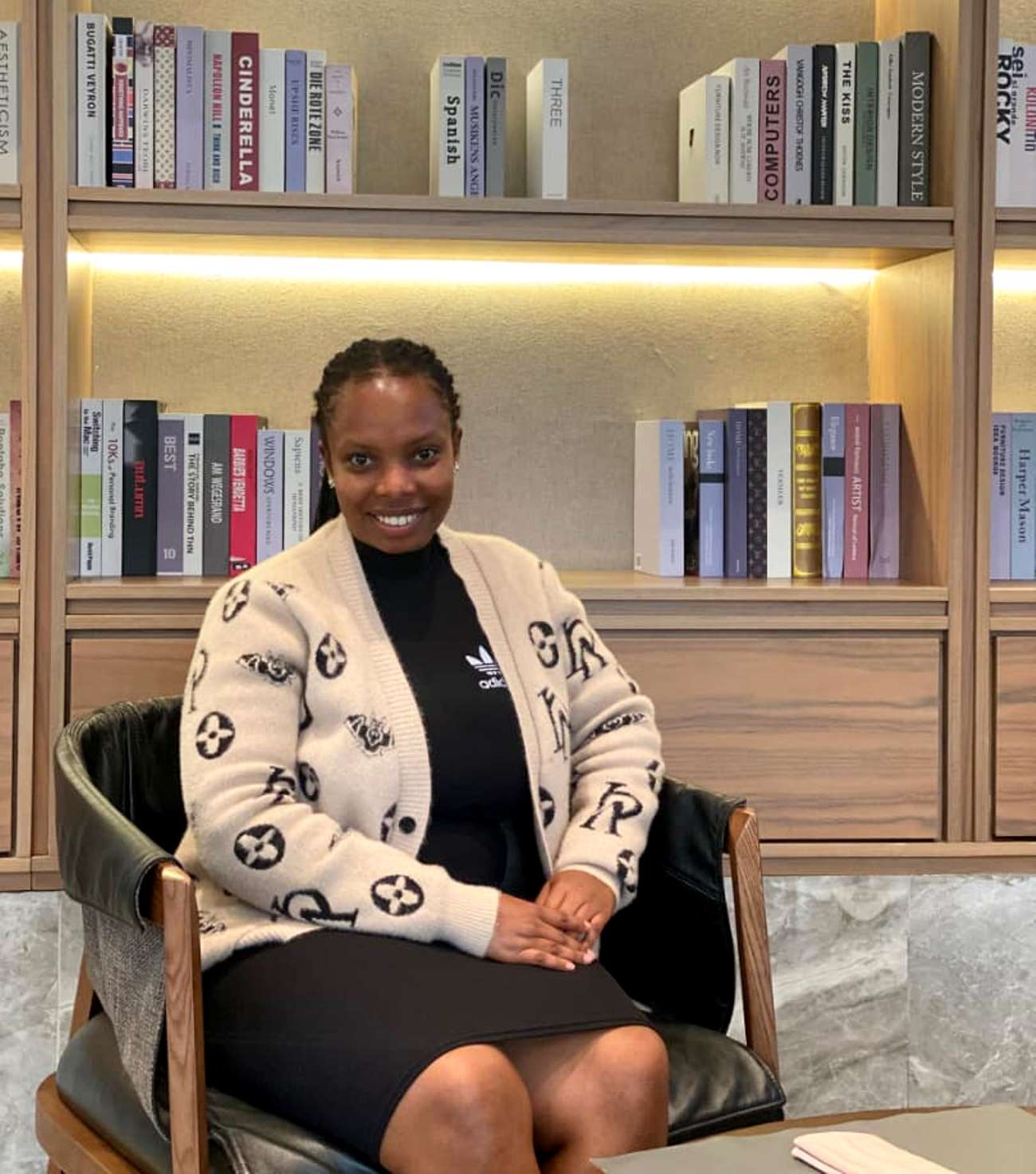
Najjuka began her academic journey at Muto Primary School in Buwama, earning 8 aggregates in the Primary Leaving Examination, a performance that positioned her strongly for secondary school.
She would later join St. Lucia Hill School, Namagoma, where she earned 20 aggregates at O-Level and 17 points in History, Luganda, and Divinity at A-Level.
Missing her dream course, Law, felt at first, like a detour. But Whitney was encouraged by Sanyu Christopher, her uncle, and she settled for a government-sponsored slot in the Bachelor of Journalism and Communication at Makerere, which she had applied for before.
She entered uncertain. But she graduates transformed.
The Pivot That Became a Purpose
Whitney speaks of her early university days with candor. She did not arrive at the Department of Journalism and Communication with a burning childhood ambition to be a journalist, but because another door had closed.
Then, Social and Behavior Change Communication happened. Applied Strategic Communication happened. She began to see media not as headlines and microphones, but as architecture, shaping how societies think, argue, and act.
The turning point came in her third year. The Female Journalist Foundation published her story on Sexual Gender-Based Violence (SGBV) and its emotional toll on survivors. What startled her was not its publication but the reaction. Comments flooded in. Debates ignited, especially about the role of men in combating GBV.
“I realized media doesn’t just report,” she says. “It frames how society views a crisis.”
Her voice, once tentative, had entered a national conversation.
The Discipline Behind 4.46
At Makerere University, a First Class CGPA is not built on brilliance alone but on ritual.
Whitney’s ritual began with showing up, on time, every time. She treated lectures as appointments with her future self. She refused to confine her learning to the syllabus. While attending workshops at the Aga Khan Graduate School of Media and Communication and obtaining external certifications, she sought and was open to mentorship through the Public Relations Association of Uganda (PRAU).
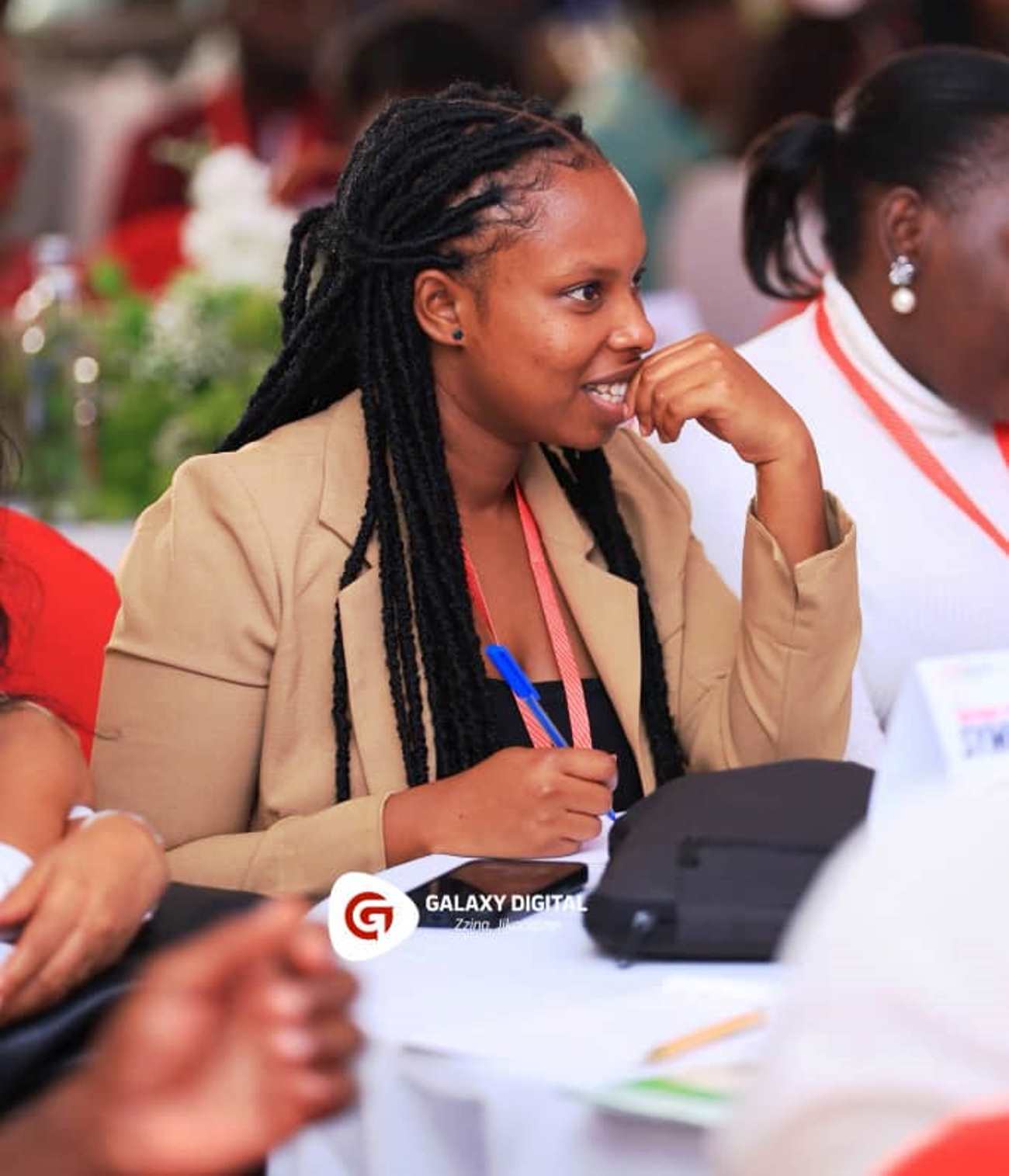
She wanted theory anchored in practice. And then there was the commute.
From Nabbingo, a hill in Wakiso District, some 18.6 km to Kampala, where the Makerere Main campus is situated, and back, nearly 20 hours a week dissolved into Kampala traffic. Two-hour journeys before 8:00 a.m. lectures. Dust. Noise. Headaches. She learned to manage energy the way others manage time. Fatigue became a tutor in resilience.
“I had to be intentional with every remaining hour,” she says. “Excuses were not an option.”
Learning to Practice Communication
If classrooms taught her analysis, presentations taught her courage. Pitching projects, defending research, and standing before peers quick to critique forced her to think on her feet. She was no longer simply studying communication; she was practicing it.
In 2024, the AGMES Fellowship at the Aga Khan Graduate School of Media and Communication pushed her further. She received funding to produce a capstone project on the mental impact of gender-based violence on survivors. She identified sources, conducted interviews, handled trauma with care, and worked with professional editors.
The Communication, she learned, is logistics and ethics as much as eloquence.
The Future She Sees
Whitney is optimistic about Uganda’s media landscape. The digital shift, she believes, has democratized influence. Young communicators are no longer confined to legacy newsrooms or offices.
Yet she sees a gap in the absence of structured research on sustainable, ethical, profitable independent media ventures in Uganda. Her ambition is not only to practice communication, but to study it. To produce data-backed frameworks that help young Ugandans transition from graduates to media entrepreneurs.
She wants to make the impact scalable.
What Remains
As the only First-Class graduate in her cohort, she is careful not to mythologize herself. “Success isn’t brilliance alone,” she says. “It’s a daily commitment when nobody is watching.”
Even before graduation, Whitney had stepped into the industry through a mentorship internship at Capital One Group (COG EA Ltd), a strategic marketing communications agency operating across East Africa.
At Capital One Group, we spoke to Paul Mwirigi Muriungi, the Managing Director and Head of Strategy, who spoke of Najjuka as a progressive and intentional young professional who approaches her work with curiosity, maturity, and responsibility.
“Her attitude is exemplary. She is teachable, receptive to feedback, and eager to grow. While technical skills can be taught, character, work ethic, and mindset determine long-term success, qualities that Whitney consistently demonstrates. Given her academic excellence and professional application, we believe she has a bright future both at Capital One Group and within the wider communications industry. She represents the kind of talent the profession needs: thoughtful, adaptable, and committed to excellence.
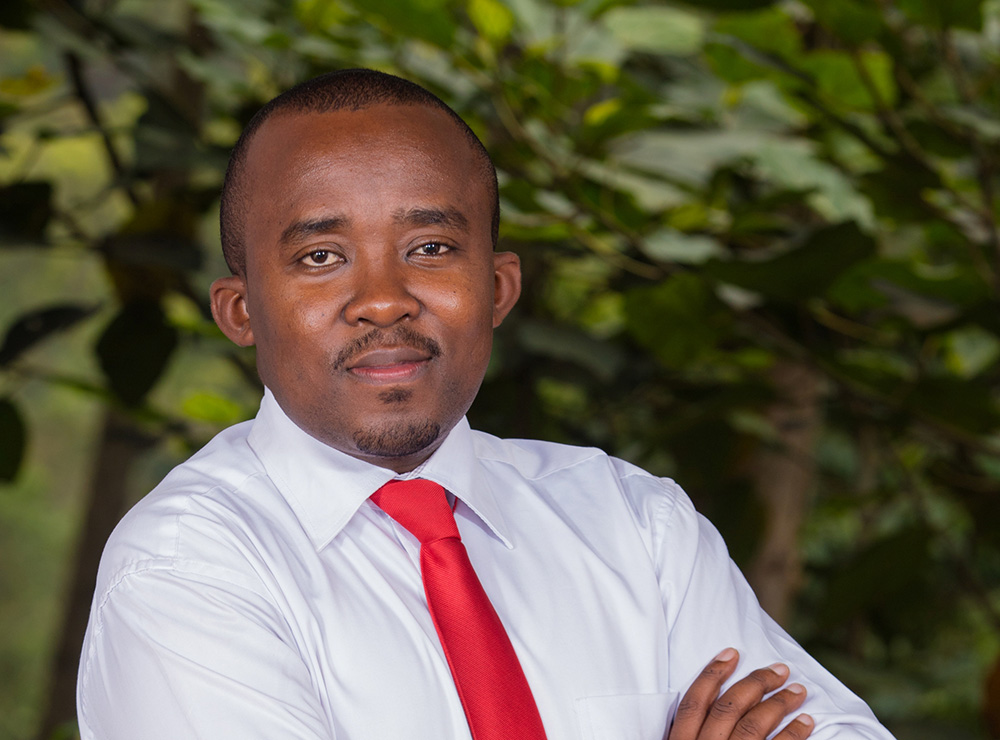
“We look forward to seeing her next chapter unfold,” says Mwirigi.
Najjuka’s gaze extends beyond her own trajectory. She speaks of what the Department could become. Furnished and equipped with industry-standard equipment, newsroom simulations, and deeper investment in data journalism as prayers. Her excellence is not self-congratulatory, but it is forward-looking.
“The University should support the Department to procure industry-standard equipment. Access to high-quality cameras, sound booths, and updated editing software like Adobe Creative Suite is critical to our learning environment,” she says.
Adding that, “We need a newsroom simulation, a physical or digital space where students work under real-time deadlines to produce content for the public. That would prepare us for industry and even strengthen the University’s own media platforms.”
In an era defined by metrics, algorithms, and digital traceability, data journalism is no longer a niche skill but a sine qua non of credible reporting. “There should also be more focus on data journalism and search engine optimization. These are no longer optional skills. Students would benefit immensely from stronger training in these areas.”
Dr. Aisha Nakiwala, the Head, Department of Journalism and Communication, says the faculty are very proud that she is graduating with a First Class—the only one in this year’s cohort.
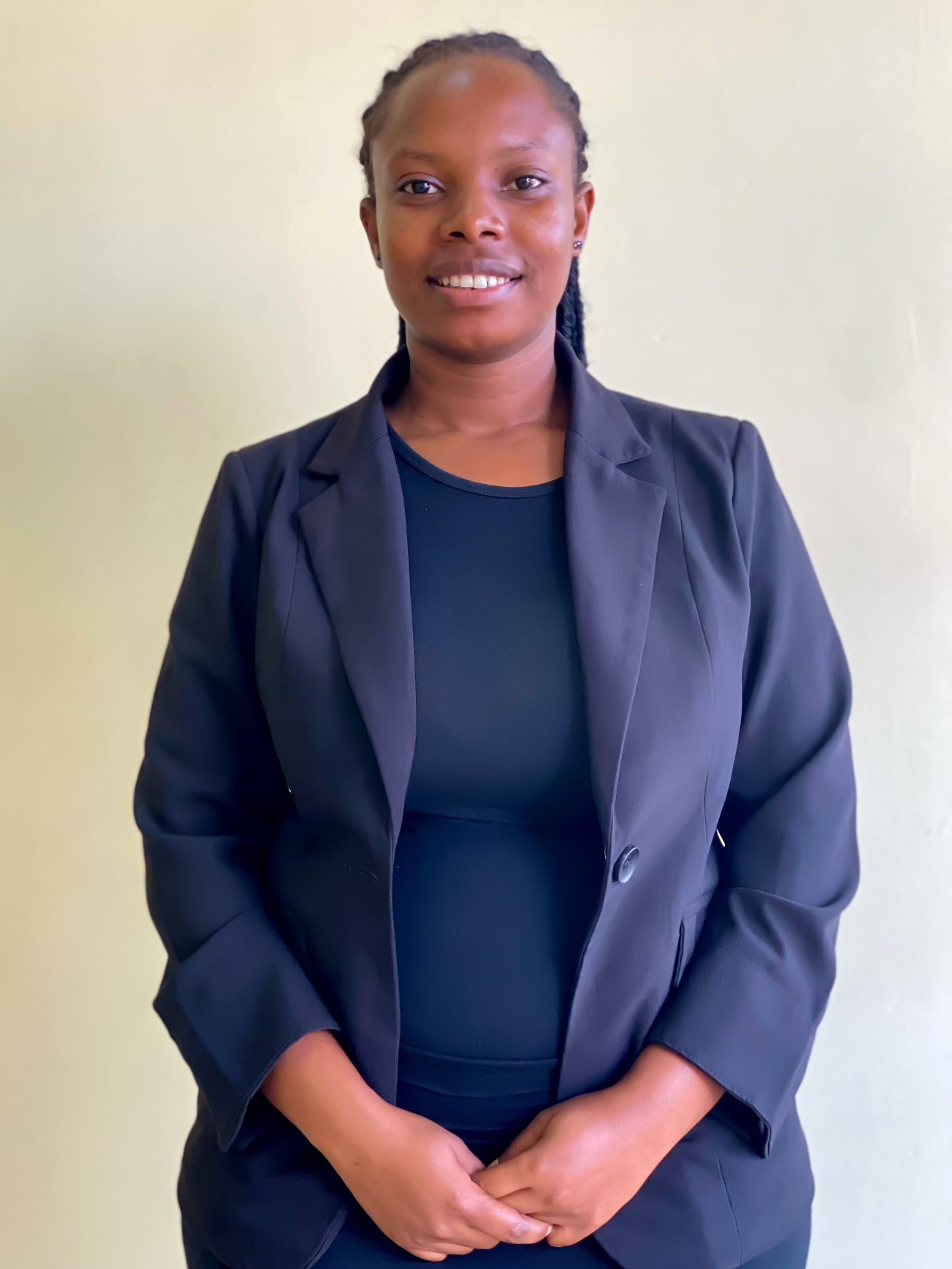
“This achievement reflects not only exceptional intellectual ability but also discipline, resilience, and sustained dedication to the highest standards over four years. Graduating with first-class honors is no small feat; it requires consistent outstanding performance.
“Her accomplishment sets a powerful example for continuing students and reaffirms our department’s commitment to nurturing excellence. We are confident she will make meaningful contributions to the communication profession and society at large,” says Dr. Nakiwala.
On graduation day, applause will crest and recede. The gowns will fold back into wardrobes. The transcripts will be filed away in cabinets. But something quieter will endure; a young woman from Nabbingo who once missed her Law mark, who spent 20 hours a week on the road, who discovered that storytelling is power, and who now walks into Freedom Square not by accident, but by intention.
Life, as she has come to understand it, lives on.
Humanities & Social Sciences
Dr. Pamela Khanakwa Honored for Steering Record 18 PhD Candidates for the Mak 2026 Graduation
Published
1 month agoon
January 23, 2026By
Jane Anyango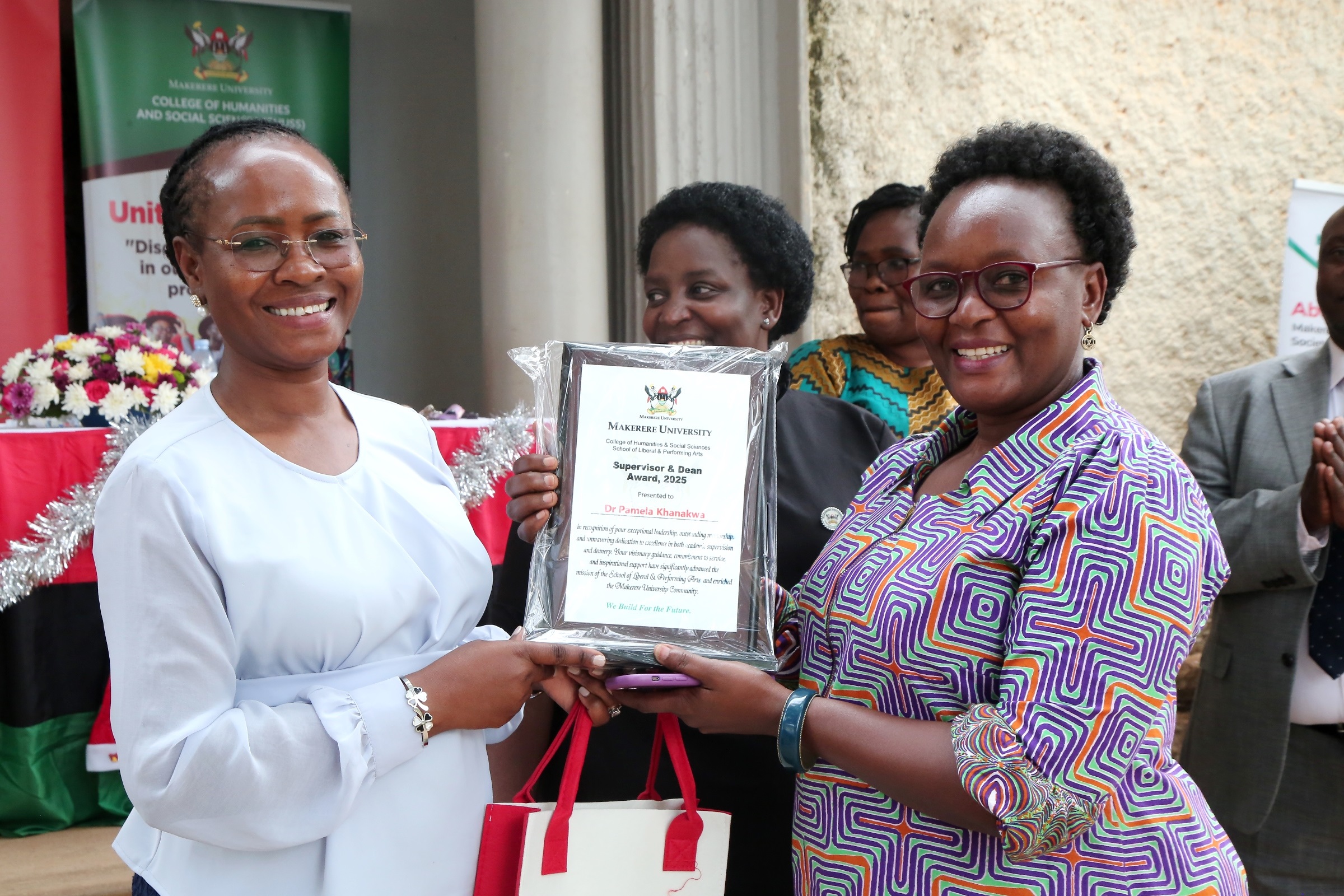
Six personally supervised, three completed in record time, as School of Liberal and Performing Arts sets a historic milestone. Dr. Pamela Khanakwa got the Award as Best PhD Supervisor and Dean
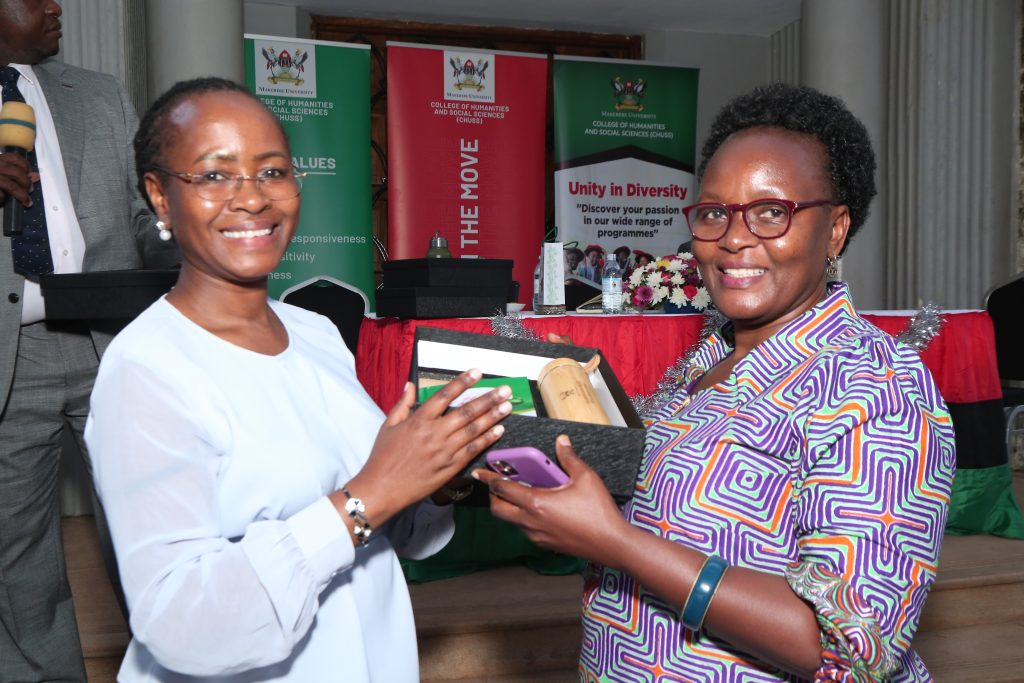
A Historic Academic Milestone for SLPA
The College of Humanities and Social Sciences (CHUSS) recognised the Dean of the School of Liberal and Performing Arts (SLPA), Dr. Pamela Khanakwa, for outstanding academic leadership that has seen the School field 18 PhD candidates for the next 2026 Makerere University Graduation Ceremony scheduled for 24th-27th February. Remarkably, six of these doctoral graduates were directly supervised by Dr. Khanakwa, with three completing within the official three-year timeframe, an exceptional achievement in graduate training. The recognition was announced during the CHUSS End-of-Year Get-Together, where staff applauded Dr. Khanakwa’s dedication, humility, and relentless commitment to postgraduate supervision and timely completion.
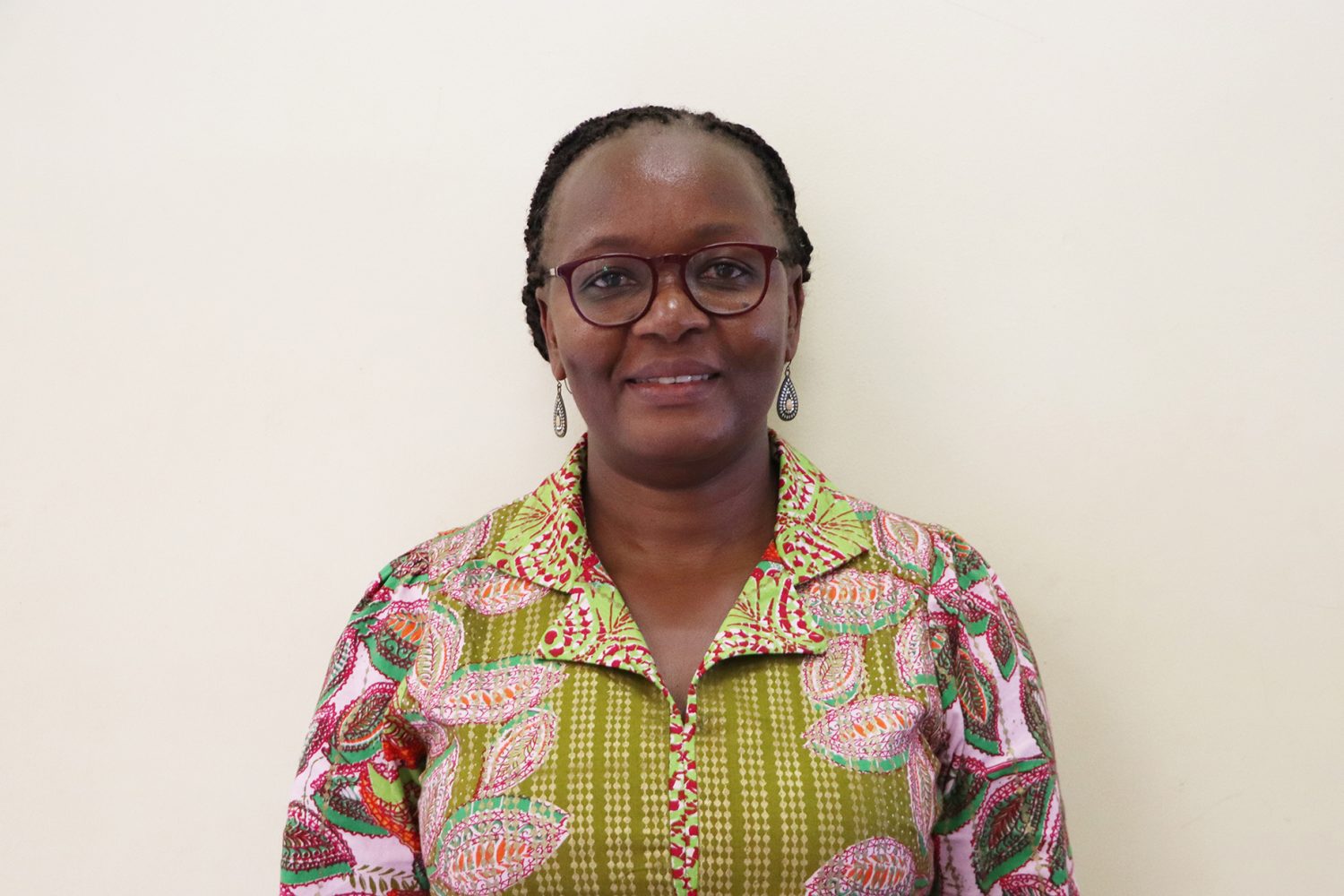
Message to Academic Staff
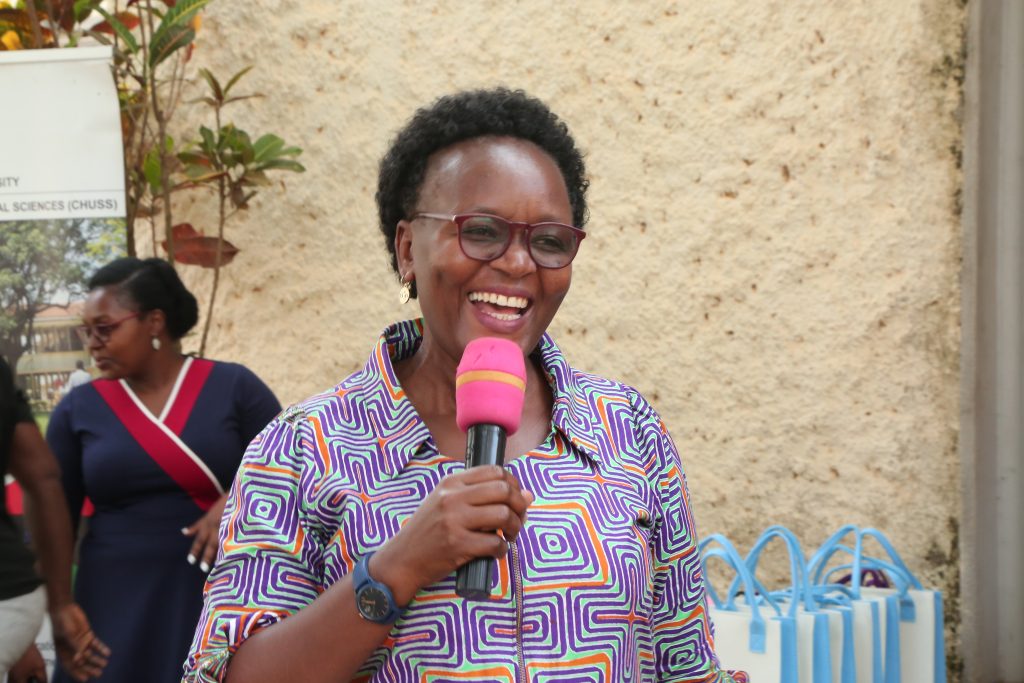
Q: What message do you have for your staff following this achievement?
Dr. Khanakwa:
First, I celebrate my staff and thank them for their dedication to supervision and student support. Academic work is demanding, and material rewards are often limited, but the true satisfaction comes from seeing students succeed.
I encourage my colleagues to remain committed. Yes, the workload is heavy, but many things are possible with dedication and teamwork. Let us continue working for the good of our students, our School, and Makerere University.
Leadership Rooted in Humility
Q: Many colleagues describe you as humble, down to earth, and hardworking. What shapes this character?
Dr. Khanakwa:
I think it is largely my upbringing. My mother was a primary school teacher from the 1950s until the mid-1980s. She worked extremely hard to raise us, combining teaching with farming to ensure we had school fees and basic needs. From her, I learned humility, discipline, and the value of hard work.
I also learned that leadership positions are temporary. You occupy them today, and tomorrow you move on. So humility is essential.
My graduate training also shaped me significantly. My PhD supervisor emphasized that graduate study is a full-time job and that results matter more than noise. Let people see your work through outcomes, not announcements.
Supervision as a Two-Way Commitment
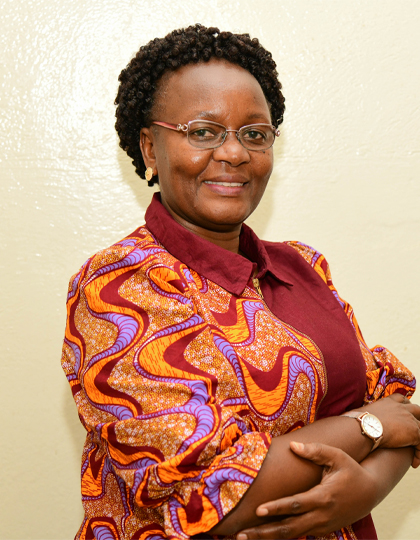
Q: How would you describe your supervision style?
Dr. Khanakwa:
I read my students’ work thoroughly, word by word. Sometimes my comments are tough, but they are honest. Supervision is a two-way commitment. I give feedback, but students must also respond and remain engaged. When that relationship works, progress happens.
Balancing Leadership, Scholarship, and Family
Q: How do you balance being a Dean, scholar, wife, mother, and daughter?
Dr. Khanakwa:
Honestly, I am not sure I balance perfectly. My mother lives far away in Bukwo, so visiting requires careful planning. My children grew up understanding the demands of academic life. I pursued my PhD in the United States and spent long periods away, but we adapted as a family.
Work has become part of my lifestyle. I use weekends to read dissertations, review manuscripts, and write. Sometimes my children ask if I ever sit without working, but this is the commitment I made. As we often say jokingly, “We humbly applied for the job, so let us do the job.”
Scholarship Beyond Supervision
Dr. Khanakwa is also an active scholar and editor. In the past year alone, she has:
- Edited scholarly volumes on archives, memory, method, and pedagogy
- Published a book with Routledge Companion
- Co-authored journal articles and book chapters with graduating students, including Priscah Asiimwe and Anatoli Lwasa Mpijja
“I feel an obligation to write with students,” she notes. “It takes time, energy, and commitment, but it is part of academic mentorship.”
Who Is Dr. Pamela Khanakwa?
Dr. Pamela Khanakwa is the Dean, School of Liberal and Performing Arts, College of Humanities and Social Sciences, Makerere University. She is a seasoned scholar, supervisor, administrator, and mentor whose leadership continues to redefine graduate training excellence. Details about Dr. Pamela Khanakwa can be accessed at: https://chuss.mak.ac.ug/en/personnel/pamela-khanakwa/
More details are available in her attached curriculum vitae.
The CHUSS End- Of-Year-Get-Together
On 12th December, 2025 the college leadership organised a get-together end of year gathering to take stock of the achievements, challenges and brainstorm together on how to move forward. The event was marked by entertainment, team building games, appreciation speeches, sharing a meal and a Christmas package for every staff
Retirees and staff recognised
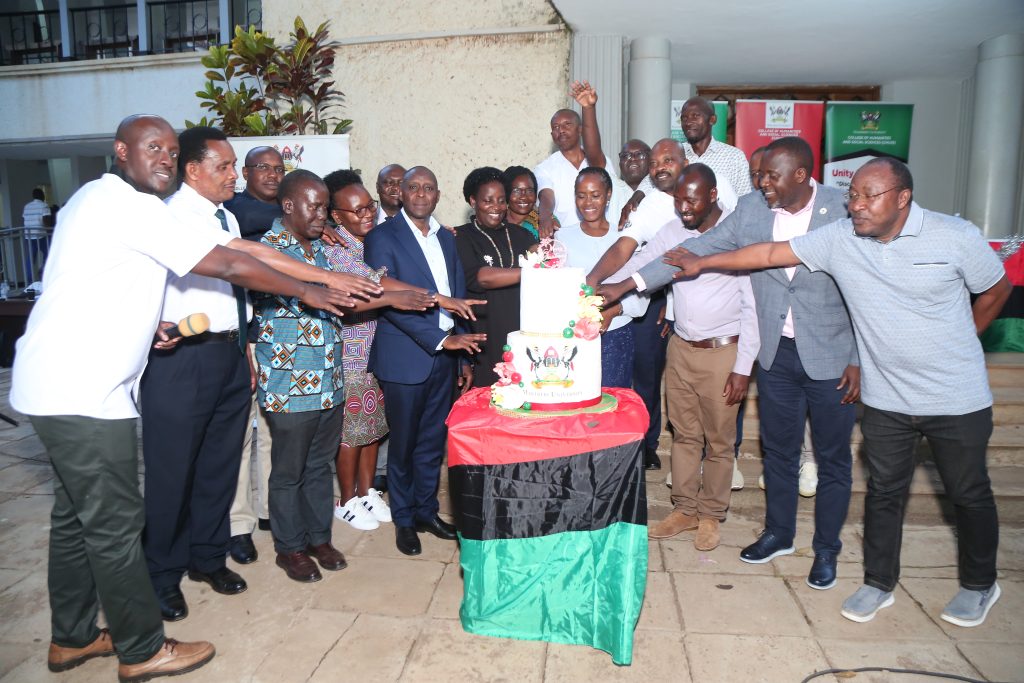
Five retired staff Dr. Micheal Wangotta Masakala, Dr. Anatole Kirigwajjo and Dr. Jackson Kizza Mukas (all from the School of Languages, Literature and Communication), Assoc. Prof. Florence Nansubuga (School of Psychology), Dr. Tusabe Gervase (School of Liberal and Perforing Arts) and Ms. Scovia Nganda Sekweyama (secretary from the School of Social Sciences) were recognised for their dedicated services to the university.
In addition to Dr. Pamela Khanakwa’s Award as Best PhD Supervisor and Dean, Ms. Birabwa Florence scooped the award of Best Registrar of the year. Birabwa is the registrar for the School of Liberal and Performing Arts.
Administrative and support staff including Ms. Mary Gyezaho and Annet Kashumbusha(both administrative secretaries in the Principals office), Farouq Lule (IT Officer), Godfrey Kakooza (cleaner), Charles Sebuguzi (driver) and Jane Anyango (Communications officer) were recognise with awards for outstanding service. Dr. Mohamed Mayanja Kajumba was from the School of Pyschology was recognised as the person with an outstanding talent in Handwriting.
The celebrations held in the Arts quadrangle were graced by the Vice Chancellor Academic Affairs Prof. Sarah Ssali and the Deputy Vice Chancellor in charge of Finance and Adminstration Prof. Ireeta Tumps.
Humanities & Social Sciences
Ugandan Journalists Trained on Peace and Gender-Sensitive Reporting Ahead of 2026 Elections
Published
2 months agoon
January 9, 2026By
Jane Anyango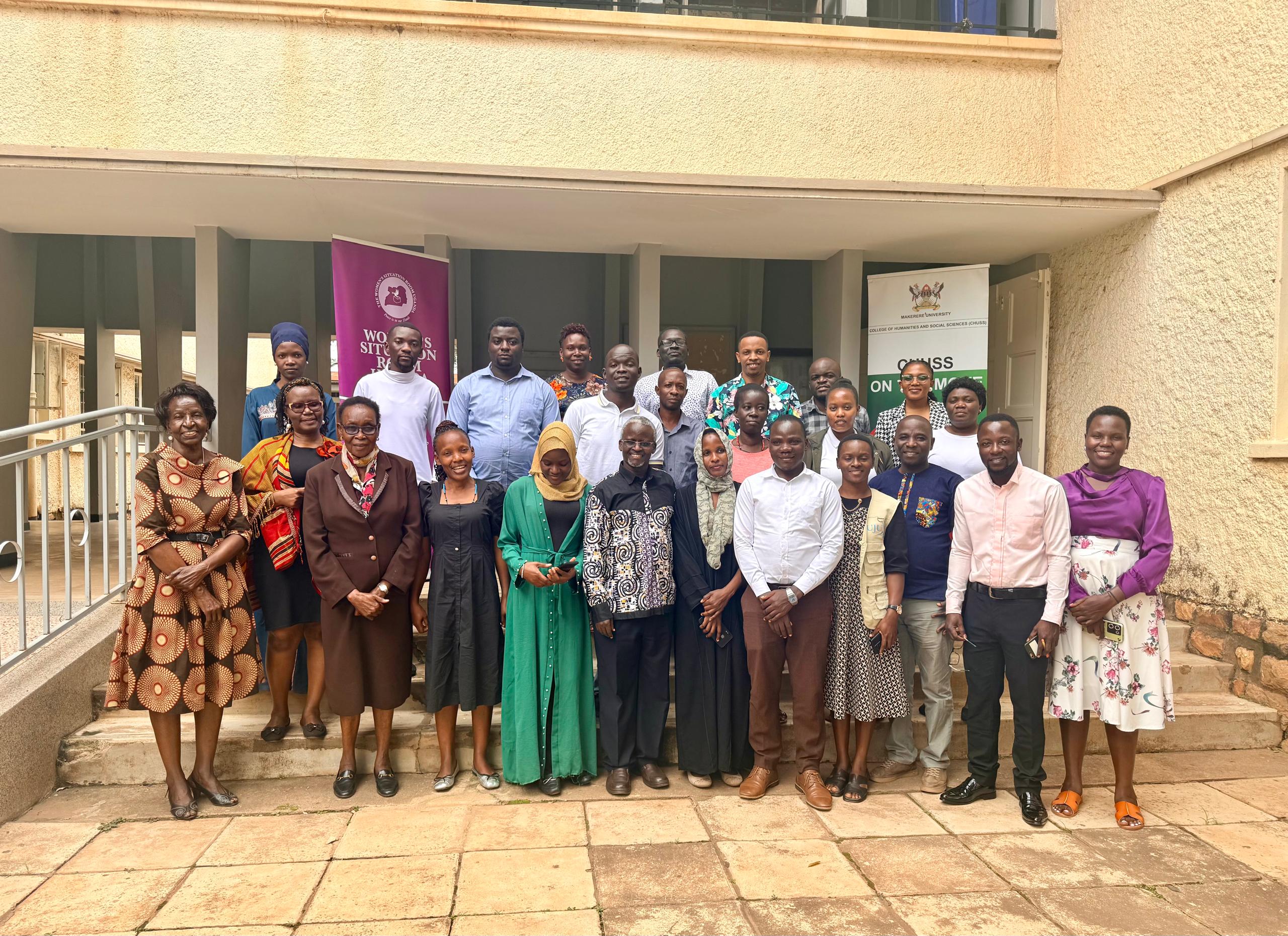
Kampala, Uganda – January 9, 2026
Ahead of the January 15 general elections, Ugandan journalists have undergone specialized training on peace and gender-sensitive reporting to ensure responsible media coverage during the election period. The two-day training, held from 8th to 9th January 2026 at Makerere University’s College of Humanities and Social Sciences Smart Room, was organized by the Women’s Situation Room (WSR) in partnership with various stakeholders and brought together journalists from across print, broadcast, and online platforms.
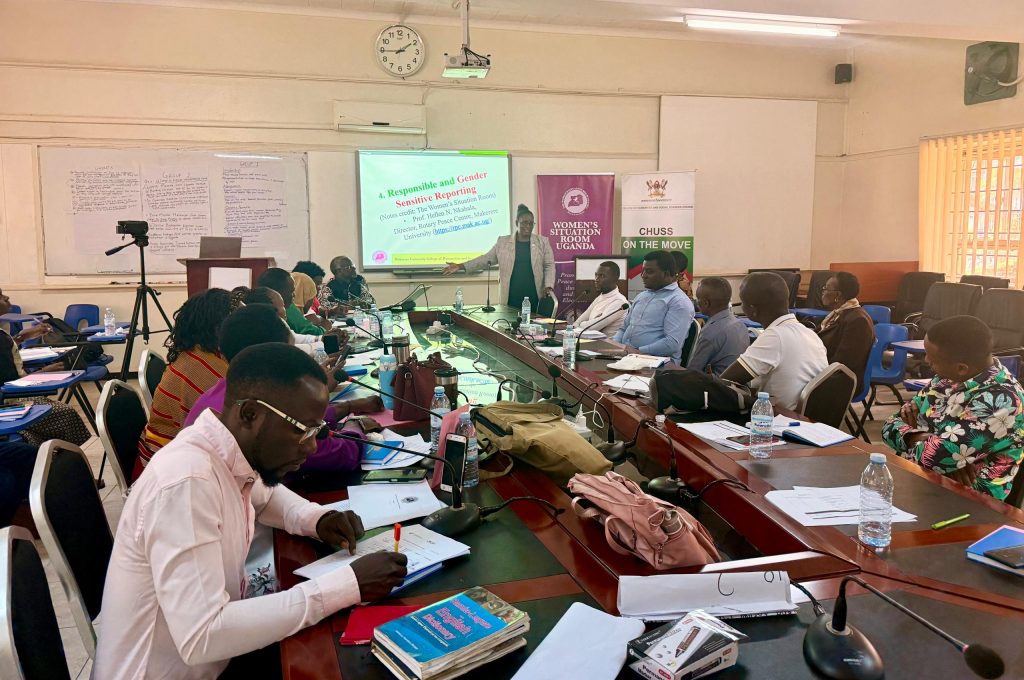
The main objective of the training was to strengthen the capacities of media in reporting and documenting electoral processes in a responsible and gender-sensitive manner. The specific objectives included: strengthening journalists’ skills to cover the 2026 elections in a fair, balanced, gender-sensitive, and non-violent partisan way; enhancing the role of media to enable citizens to be well-informed and actively participate in the election process; ensuring focused and balanced reporting on peace during and after elections; and strengthening partnerships between the WSR and media houses during the election period.
The training covered multiple critical modules. Day one focused on responsible conflict-sensitive reporting, emphasizing principles such as balance, impartiality, and accuracy. Participants explored the role of media as a relayer of the population’s voice, election monitor, catalyst for social cohesion and reconciliation, contributor to the accountability of political actors, and a platform for detecting and debunking digital media misinformation and hate speech.
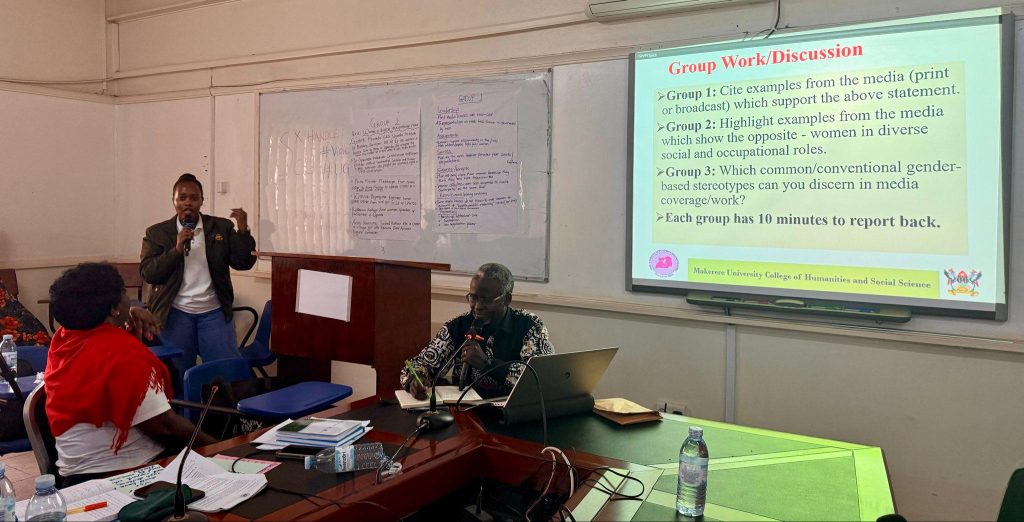
Day two addressed responsible and gender-sensitive reporting. Key aspects included the definition of gender-sensitive reporting, how to become a gender-sensitive reporter, critical elements in reporting with gender awareness, packaging gender-sensitive stories, and a checklist for detecting and avoiding gender-insensitive reporting.
Her Lordship, retired Judge Justice Mary Mayitum, emphasized the importance of peace as the foundation of development and democratic engagement. “Because we value peace more than anything. Without peace, really, you can do nothing. But where there is peace, you can have time to reflect, discuss with others, and join in meaningful dialogue,” she said. She warned that the country’s past conflicts, such as those in Gulu, underscored the necessity of maintaining national harmony.
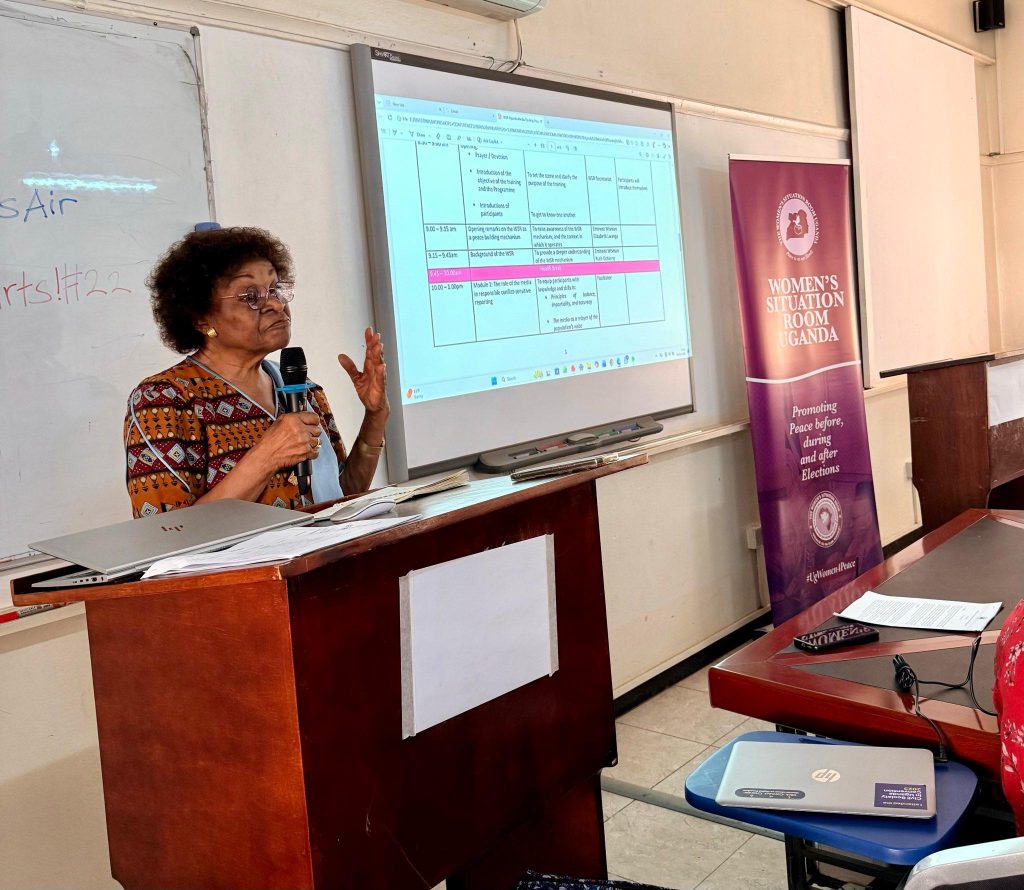
Justice Mayitum also urged other key election stakeholders to uphold peaceful conduct. “Being peaceful is the very heart of life. We have spoken to police, security personnel, political parties, and the Electoral Commission. We want politicians to have a code of conduct and to understand that it’s okay to think differently without fighting or hating one another,” she added.
Dr. William Tayebwa, lead facilitator and senior lecturer in the Department of Journalism and Communication at Makerere University, said, “This training is about conflict-sensitive reporting, peace journalism, and gender-sensitive reporting in the context of the elections. The emphasis was on giving female political candidates a voice while ensuring journalists report responsibly on election-related matters.”
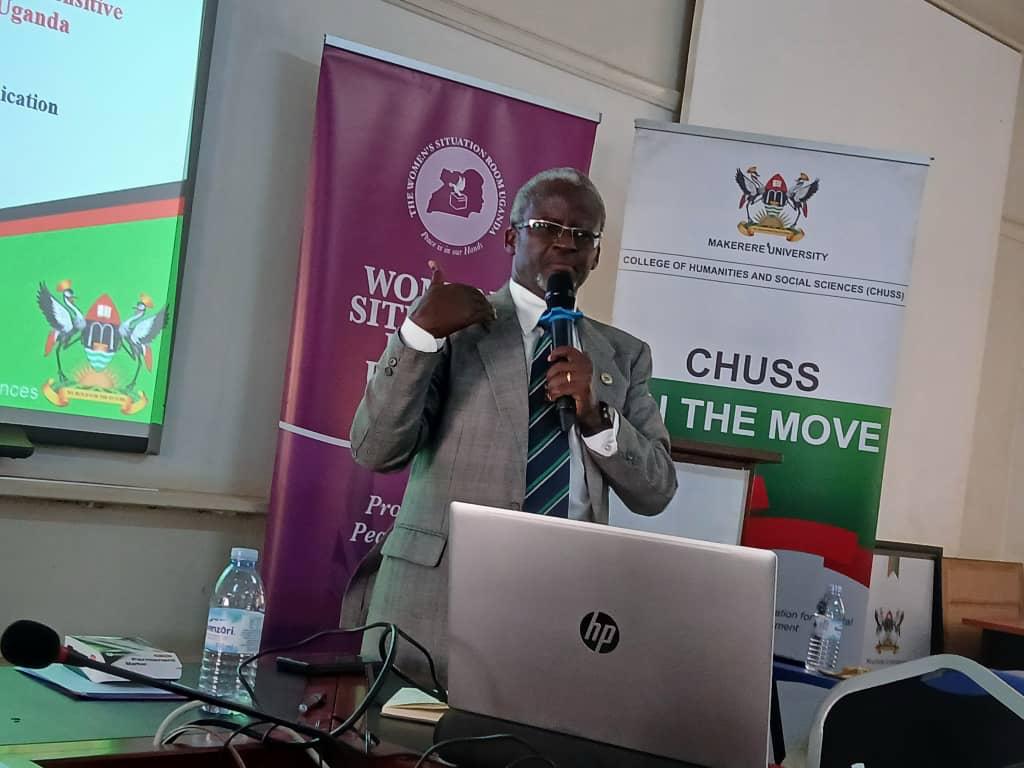
Participants described the training as timely and impactful. Tony Banizengabo of CBS Wakiso District said, “We’ve benefited a lot. We’ve been trained to write stories which bring peace, not conflict. Ahead of the elections, we are very ready to be part of peacemakers.”
Dorcas Kimono of UBC TV Kampala added, “It was so timely and rich. We learned how to report without promoting or fueling violence, giving voice to victims without angering them or encouraging violators. This is very vital, especially as we approach the 2026 elections.”
The training aims to equip media personnel with the knowledge and skills to uphold professional ethics while contributing to a peaceful, inclusive, and gender-sensitive electoral process.
Trending
-

 Humanities & Social Sciences2 days ago
Humanities & Social Sciences2 days agoMeet Najjuka Whitney, The Girl Who Missed Law and Found Her Voice
-

 Health7 days ago
Health7 days agoUganda has until 2030 to end Open Defecation as Ntaro’s PhD Examines Kabale’s Progress
-

 Agriculture & Environment5 days ago
Agriculture & Environment5 days agoUganda Martyrs Namugongo Students Turn Organic Waste into Soap in an Innovative School Project on Sustainable Waste Management
-

 General7 days ago
General7 days agoMastercard Foundation Scholars embrace and honour their rich cultural diversity
-

 Health2 weeks ago
Health2 weeks agoCall for Applications: Short Course in Molecular Diagnostics March 2026